The Empire Strikes Back 100 - 1901-1906
Announcing the Session
Senators,
Your presence is requested for a State of the Empire address on January 1st, 1906. It will be held in the main Senate hall in the Grand Palace.
The archivists consider the following newspapers to be of historical significance.
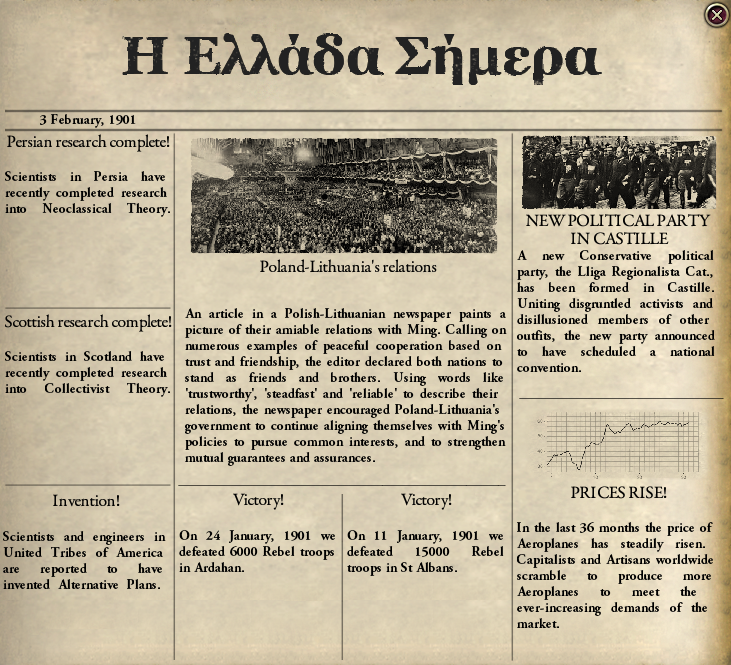
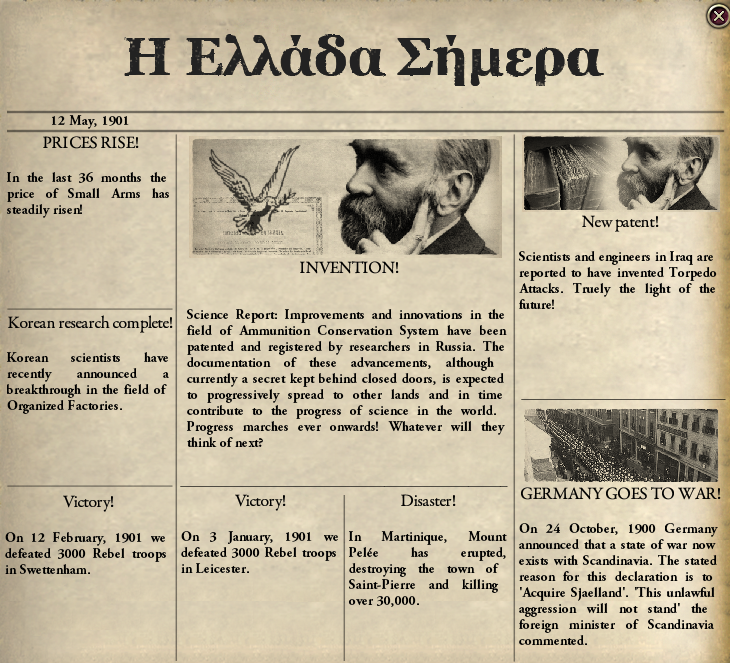
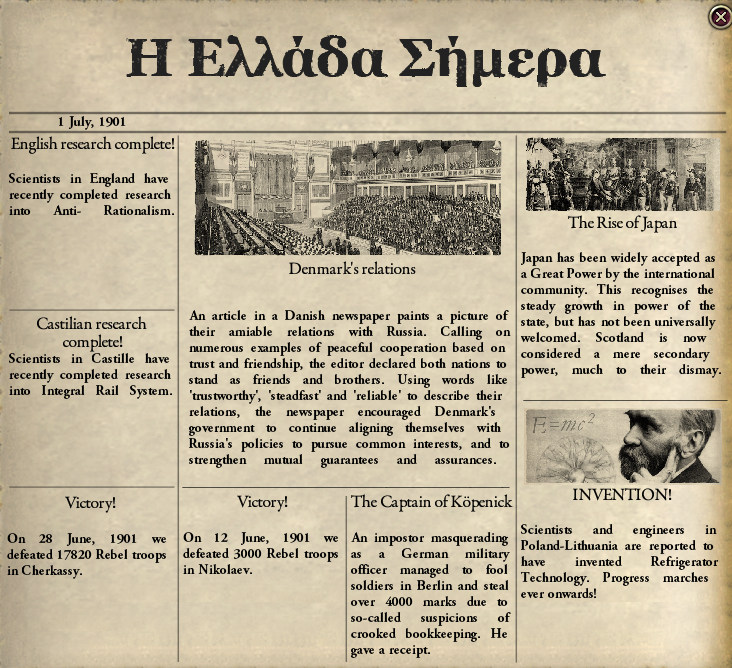
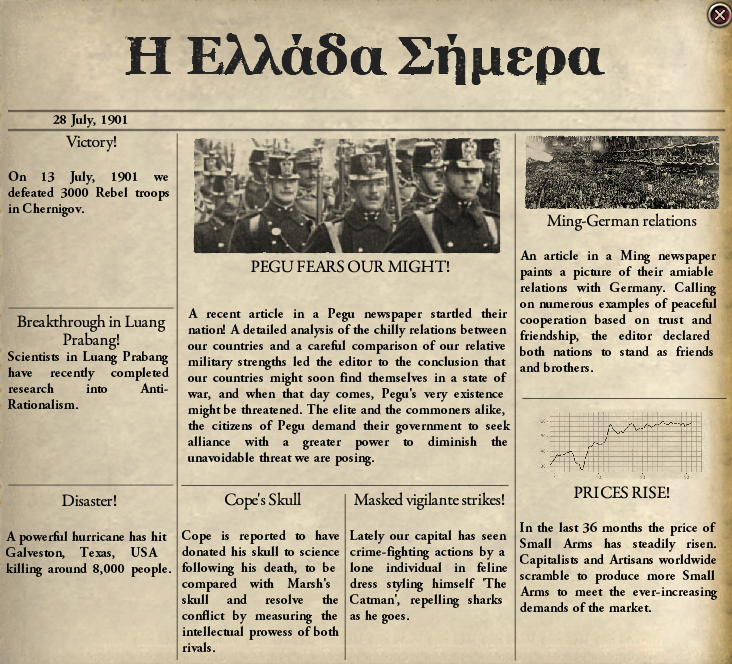
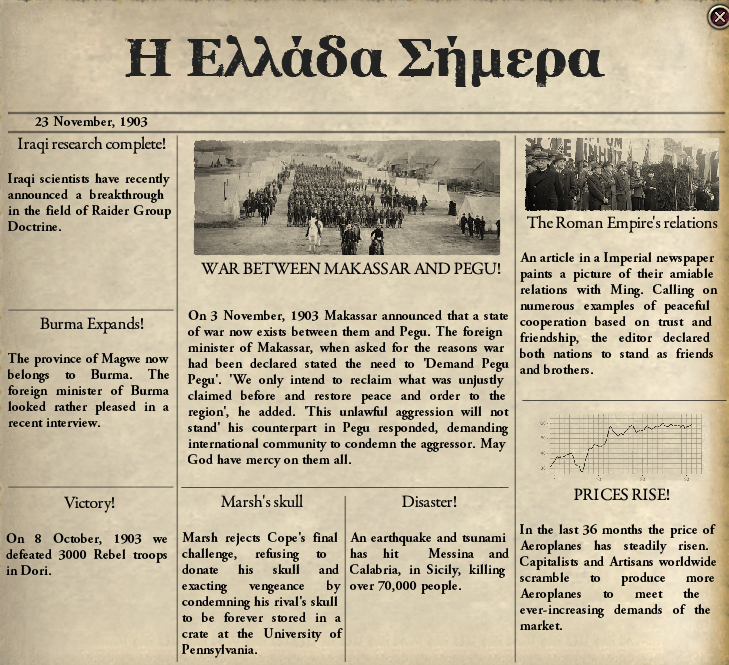
And the Senate’s world map is being updated.
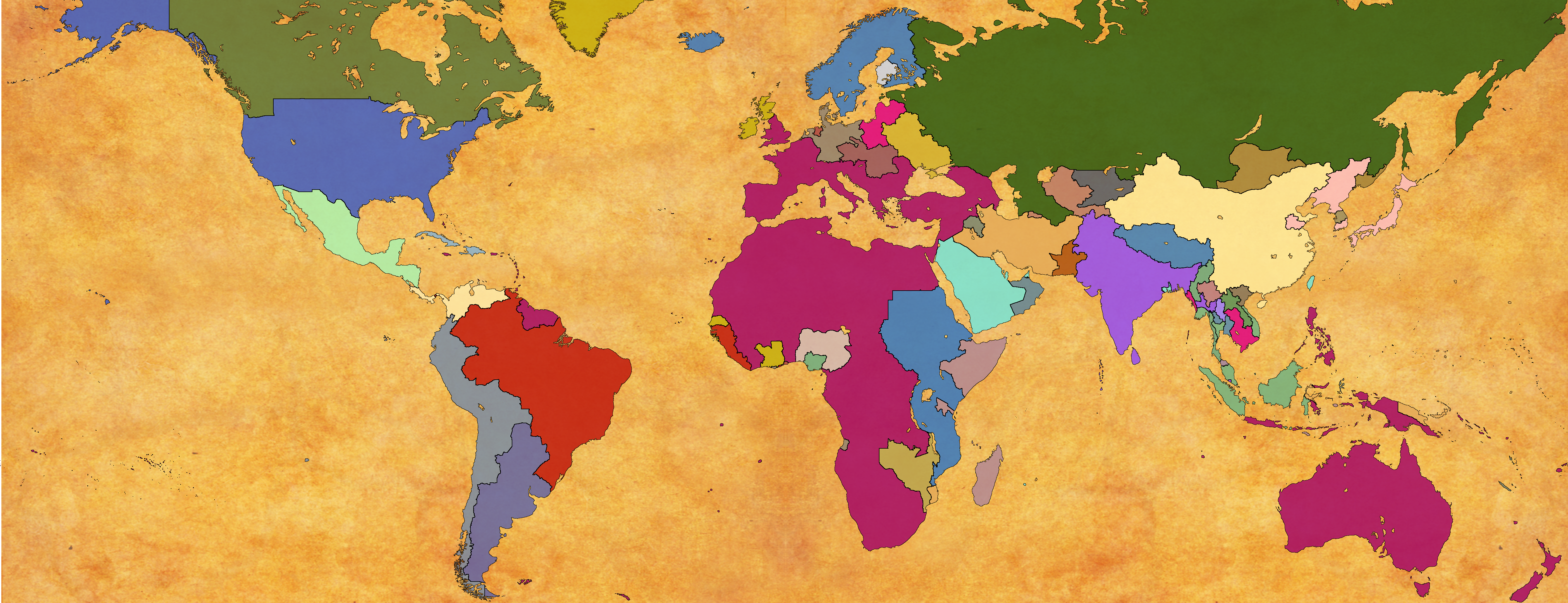
Senators' Discussion
The capital has been so much quieter as of late. This Catman seems to have the underworld on the run. We should try to enlist his services.
The world continues to think it can defy the Roman Empire, but yet again they shall be shown that nothing can occur without our consent.
These radios are absolutely fascinating. To think that someone’s voice can be recorded and then projected all across the empire. How baffling.
- Senator Raphael Favero
Mount Pelee erupts and there’s been an earthquake in Messina…I pray for the lives of those affected by these calamities.
Interesting, this “Catman” guy. He is a vigilante, but he seems to be working quite well in assisting the Secret Police and the normal police forces. He would make a fine addition to the Ministry of Security, should he choose to join us.
How dare they sink the Constantinople! The English and Spaniards and their allies are fools to mess with the might of the Empire!
I hope all of you are well after the Konstantinian and Jacobin revolts of the past few years. There have also been a few small Jacobin and communist rebellions in 1903, but the Ministry of Security made sure they didn’t get anywhere.
Radio…this sounds interesting, like flying machines.
- Senator Michael Doukas
We must have the third way! I transfer my allegiance to the Varangian Guard and alliance my leadership of this glorious party! We shall make Rome strong and great!
As Armaments Minister, I have announced the modernization of the army to bolt action rifles and I am also directing artillery reforms.
I will seek to build a small tanks corps in the near future to help us in future wars against the barbarians that reside outside our borders.
- Senator Christophoros Palaiologos
Senators,
My I present myself after Aiden Gray returned to his Senatorial seat in Brittany, citizens of the region where allowed to vote as to their choice of candidate. The first true free general election in the Empire. After a long process and with my great predecessor helping me on the campaign I was victorious and now report to the Emperor for service.
I am Alan Gael, I follow the political beliefs of equality and workers rights. It grieves me that the stench of the third way has polluted the Senate. Aiden warned me of Senators Doukas and Favero, but a new snake has appeared to take up this flag.
I put myself at the Emperor beck and call.
- Senator Gael
((private))
Dr. Stavridis’s Diary
30 September.I got home at five o’clock, and found that Doukas and Quintus had not only arrived, but had already studied the transcript of the various diaries and letters which Dalassenos had not yet returned from his visit to the carriers’ men. Mrs. Dalassenos gave us a cup of tea, and I can honestly say that, for the first time since I have lived in it, this old house seemed like home. When we had finished, Mrs. Dalassenos said,
“Dr. Stavridis, may I ask a favor? I want to see your patient, Mr. Renato. Do let me see him. What you have said of him in your diary interests me so much!”
She looked so appealing and so pretty that I could not refuse her, and there was no possible reason why I should, so I took her with me. When I went into the room, I told the man that a lady would like to see him, to which he simply answered, “Why?”
“She is going through the house, and wants to see every one in it,” I answered.
“Oh, very well,” he said, “let her come in, by all means, but just wait a minute till I tidy up the place.”
His method of tidying was peculiar, he simply swallowed all the flies and spiders in the boxes before I could stop him. It was quite evident that he feared, or was jealous of, some interference. When he had got through his disgusting task, he said cheerfully, “Let the lady come in,” and sat down on the edge of his bed with his head down, but with his eyelids raised so that he could see her as she entered. For a moment I thought that he might have some homicidal intent. I remembered how quiet he had been just before he attacked me in my own study, and I took care to stand where I could seize him at once if he attempted to make a spring at her.
She came into the room with an easy gracefulness which would at once command the respect of any lunatic, for easiness is one of the qualities mad people most respect. She walked over to him, smiling pleasantly, and held out her hand.
“Good evening, Mr. Renato,” said she. “You see, I know you, for Dr. Stavridis has told me of you.” He made no immediate reply, but eyed her all over intently with a set frown on his face. This look gave way to one of wonder, which merged in doubt, then to my intense astonishment he said, “You’re not the girl the doctor wanted to marry, are you? You can’t be, you know, for she’s dead.”
Mrs. Dalassenos smiled sweetly as she replied, “Oh no! I have a husband of my own, to whom I was married before I ever saw Dr. Stavridis, or he me. I am Mrs. Dalassenos.”
“Then what are you doing here?”
“My husband and I are staying on a visit with Dr. Stavridis.”
“Then don’t stay.”
“But why not?”
I thought that this style of conversation might not be pleasant to Mrs. Dalassenos any more than it was to me, so I joined in, “How did you know I wanted to marry anyone?”
His reply was simply contemptuous, given in a pause in which he turned his eyes from Mrs. Harker to me, instantly turning them back again, “What an asinine question!”
“I don’t see that at all, Mr. Renato,” said Mrs. Dalassenos, at once championing me.
He replied to her with as much courtesy and respect as he had shown contempt to me, “You will, of course, understand, Mrs. Dalassenos, that when a man is so loved and honored as our host is, everything regarding him is of interest in our little community. Dr. Stavridis is loved not only by his household and his friends, but even by his patients, who, being some of them hardly in mental equilibrium, are apt to distort causes and effects. Since I myself have been an inmate of a lunatic asylum, I cannot but notice that the sophistic tendencies of some of its inmates lean towards the errors of non causa and ignoratio elenche.”
I positively opened my eyes at this new development. Here was my own pet lunatic, the most pronounced of his type that I had ever met with, talking elemental philosophy, and with the manner of a polished gentleman. I wonder if it was Mrs. Dalassenos’s presence which had touched some chord in his memory. If this new phase was spontaneous, or in any way due to her unconscious influence, she must have some rare gift or power.
We continued to talk for some time, and seeing that he was seemingly quite reasonable, she ventured, looking at me questioningly as she began, to lead him to his favorite topic. I was again astonished, for he addressed himself to the question with the impartiality of the completest sanity. He even took himself as an example when he mentioned certain things.
“Why, I myself am an instance of a man who had a strange belief. Indeed, it was no wonder that my friends were alarmed, and insisted on my being put under control. I used to fancy that life was a positive and perpetual entity, and that by consuming a multitude of live things, no matter how low in the scale of creation, one might indefinitely prolong life. At times I held the belief so strongly that I actually tried to take human life. The doctor here will bear me out that on one occasion I tried to kill him for the purpose of strengthening my vital powers by the assimilation with my own body of his life through the medium of his blood, relying of course, upon the Scriptural phrase, ‘For the blood is the life.’ Though, indeed, the vendor of a certain nostrum has vulgarized the truism to the very point of contempt. Isn’t that true, doctor?”
I nodded assent, for I was so amazed that I hardly knew what to either think or say, it was hard to imagine that I had seen him eat up his spiders and flies not five minutes before. Looking at my watch, I saw that I should go to the station to meet Von Habsburg, so I told Mrs. Dalassenos that it was time to leave.
She came at once, after saying pleasantly to Mr. Renato, “Goodbye, and I hope I may see you often, under auspices pleasanter to yourself.”
To which, to my astonishment, he replied, “Goodbye, my dear. I pray God I may never see your sweet face again. May He bless and keep you!”
When I went to the station to meet Von Habsburg I left the boys behind me. Poor Mike seemed more cheerful than he has been since Loukia first took ill, and Markos is more like his own bright self than he has been for many a long day.
Von Habsburg stepped from the carriage with the eager nimbleness of a boy. He saw me at once, and rushed up to me, saying, “Ah, friend John, how goes all? Well? So! I have been busy, for I come here to stay if need be. All affairs are settled with me, and I have much to tell. Madam Mara is with you? Yes. And her so fine husband? And Michael and my friend Markos, they are with you, too? Good!”
As I drove to the house I told him of what had passed, and of how my own diary had come to be of some use through Mrs. Dalasenos’s suggestion, at which the Professor interrupted me.
“Ah, that wonderful Madam Mara! She has man’s brain, a brain that a man should have were he much gifted, and a woman’s heart. The good God fashioned her for a purpose, believe me, when He made that so good combination. Friend John, up to now fortune has made that woman of help to us, after tonight she must not have to do with this so terrible affair. It is not good that she run a risk so great. We men are determined, nay, are we not pledged, to destroy this monster? But it is no part for a woman. Even if she be not harmed, her heart may fail her in so much and so many horrors and hereafter she may suffer, both in waking, from her nerves, and in sleep, from her dreams. And, besides, she is young woman and not so long married, there may be other things to think of some time, if not now. You tell me she has wrote all, then she must consult with us, but tomorrow she say goodbye to this work, and we go alone.”
I agreed heartily with him, and then I told him what we had found in his absence, that the house which Dracula had bought was the very next one to my own. He was amazed, and a great concern seemed to come on him.
“Oh that we had known it before!” he said, “for then we might have reached him in time to save poor Loukia. However, ‘the milk that is spilt cries not out afterwards,’ as you say. We shall not think of that, but go on our way to the end.” Then he fell into a silence that lasted till we entered my own gateway. Before we went to prepare for dinner he said to Mrs. Dalassenos, “I am told, Madam Mara, by my friend John that you and your husband have put up in exact order all things that have been, up to this moment.”
“Not up to this moment, Professor,” she said impulsively, “but up to this morning.”
“But why not up to now? We have seen hitherto how good light all the little things have made. We have told our secrets, and yet no one who has told is the worse for it.”
Mrs. Dalassenos began to blush, and taking a paper from her pockets, she said, “Dr. Von Habsburg, will you read this, and tell me if it must go in. It is my record of today. I too have seen the need of putting down at present everything, however trivial, but there is little in this except what is personal. Must it go in?”
The Professor read it over gravely, and handed it back, saying, “It need not go in if you do not wish it, but I pray that it may. It can but make your husband love you the more, and all us, your friends, more honor you, as well as more esteem and love.” She took it back with another blush and a bright smile.
And so now, up to this very hour, all the records we have are complete and in order. The Professor took away one copy to study after dinner, and before our meeting, which is fixed for nine o’clock. The rest of us have already read everything, so when we meet in the study we shall all be informed as to facts, and can arrange our plan of battle with this terrible and mysterious enemy.Mara Dalassenos’s Journal
30 September, 1905When we met in Dr. Stavridis’s study two hours after dinner, which had been at six o’clock, we unconsciously formed a sort of board or committee. Professor Von Habsburg took the head of the table, to which Dr. Stavridis motioned him as he came into the room. He made me sit next to him on his right, and asked me to act as secretary. Ioannes sat next to me. Opposite us were Senator Doukas, Dr. Stavridis, and Mr. Quintus, Senator Doukas being next the Professor, and Dr. Stavridis in the center.
The Professor said, “I may, I suppose, take it that we are all acquainted with the facts that are in these papers.” We all expressed assent, and he went on, “Then it were, I think, good that I tell you something of the kind of enemy with which we have to deal. I shall then make known to you something of the history of this man, which has been ascertained for me. So we then can discuss how we shall act, and can take our measure according.
“There are such beings as vampires, some of us have evidence that they exist. Even had we not the proof of our own unhappy experience, the teachings and the records of the past give proof enough for sane peoples. I admit that at the first I was sceptic. Were it not that through long years I have trained myself to keep an open mind, I could not have believed until such time as that fact thunder on my ear.’See! See! I prove, I prove.’ Alas! Had I known at first what now I know, nay, had I even guess at him, one so precious life had been spared to many of us who did love her. But that is gone, and we must so work, that other poor souls perish not, whilst we can save. The nosferatu do not die like the bee when he sting once. He is only stronger, and being stronger, have yet more power to work evil. This vampire which is amongst us is of himself so strong in person as twenty men, he is of cunning more than mortal, for his cunning be the growth of ages, he have still the aids of necromancy, which is, as his etymology imply, the divination by the dead, and all the dead that he can come nigh to are for him at command, he is brute, and more than brute, he is devil in callous, and the heart of him is not, he can, within his range, direct the elements, the storm, the fog, the thunder, he can command all the meaner things, the rat, and the owl, and the bat, the moth, and the fox, and the wolf, he can grow and become small, and he can at times vanish and come unknown. How then are we to begin our strike to destroy him? How shall we find his where, and having found it, how can we destroy? My friends, this is much, it is a terrible task that we undertake, and there may be consequence to make the brave shudder. For if we fail in this our fight he must surely win, and then where end we? Life is nothings, I heed him not. But to fail here, is not mere life or death. It is that we become as him, that we henceforward become foul things of the night like him, without heart or conscience, preying on the bodies and the souls of those we love best. To us forever are the gates of heaven shut, for who shall open them to us again? We go on for all time abhorred by all, a blot on the face of God’s sunshine, an arrow in the side of Him who died for man. But we are face to face with duty, and in such case must we shrink? For me, I say no, but then I am old, and life, with his sunshine, his fair places, his song of birds, his music and his love, lie far behind. You others are young. Some have seen sorrow, but there are fair days yet in store. What say you?”
Whilst he was speaking, Ioannes had taken my hand. I feared, oh so much, that the appalling nature of our danger was overcoming him when I saw his hand stretch out, but it was life to me to feel its touch, so strong, so self reliant, so resolute. A brave man’s hand can speak for itself, it does not even need a woman’s love to hear its music.
When the Professor had done speaking my husband looked in my eyes, and I in his, there was no need for speaking between us.
“I answer for Ioannes and myself,” I said.
“Count me in, Professor,” said Mr. Quintus, laconically as usual.
“I am with you,” said Senator Doukas, “For Loukia’s sake, if for no other reason.”
Dr. Stavridis simply nodded.
The Professor stood up and, after laying his golden crucifix on the table, held out his hand on either side. I took his right hand, and Senator Doukas his left, Ioannes held my right with his left and stretched across to Mr. Quintus. So as we all took hands our solemn compact was made. I felt my heart icy cold, but it did not even occur to me to draw back. We resumed our places, and Dr. Von Habsburg went on with a sort of cheerfulness which showed that the serious work had begun. It was to be taken as gravely, and in as businesslike a way, as any other transaction of life.
“Well, you know what we have to contend against, but we too, are not without strength. We have on our side power of combination, a power denied to the vampire kind, we have sources of science, we are free to act and think, and the hours of the day and the night are ours equally. In fact, so far as our powers extend, they are unfettered, and we are free to use them. We have self devotion in a cause and an end to achieve which is not a selfish one. These things are much.
“Now let us see how far the general powers arrayed against us are restrict, and how the individual cannot. In fine, let us consider the limitations of the vampire in general, and of this one in particular.
“All we have to go upon are traditions and superstitions. These do not at the first appear much, when the matter is one of life and death, nay of more than either life or death. Yet must we be satisfied, in the first place because we have to be, no other means is at our control, and secondly, because, after all these things, tradition and superstition, are everything. Does not the belief in vampires rest for others, though not, alas! for us, on them! A year ago which of us would have received such a possibility, in the midst of our scientific, sceptical, matter-of-fact nineteenth century? We even scouted a belief that we saw justified under our very eyes. Take it, then, that the vampire, and the belief in his limitations and his cure, rest for the moment on the same base. For, let me tell you, he is known everywhere that men have been. In old Greece, in the old Empire, he flourish in Germany all over, in Gallia, in India, even in the Chersonese, and in China, so far away across the world from us, there even is he, and the peoples fear him at this day. He have follow the wake of the berserker Icelander, the devil-begotten Hun, the Slav, the Saxon, the Magyar.
“So far, then, we have all we may act upon, and let me tell you that very much of the beliefs are justified by what we have seen in our own so unhappy experience. The vampire live on, and cannot die by mere passing of the time, he can flourish when that he can fatten on the blood of the living. Even more, we have seen amongst us that he can even grow younger, that his vital faculties grow strenuous, and seem as though they refresh themselves when his special pabulum is plenty.
“But he cannot flourish without this diet, he eat not as others. Even friend Ioannes, who lived with him for weeks, did never see him eat, never! He throws no shadow, he make in the mirror no reflect, as again Ioannes observe. He has the strength of many of his hand, witness again Ioannes when he shut the door against the wolves, and when he help him from the diligence too. He can transform himself to wolf, as we gather from the ship arrival in Golden Horn, when he tear open the dog, he can be as bat, as Madam Mara saw him on the window at Golden Horn, and as friend John saw him fly from this so near house, and as my friend Markos saw him at the window of Miss Loukia.
“He can come in mist which he create, that noble ship’s captain proved him of this, but, from what we know, the distance he can make this mist is limited, and it can only be round himself.
“He come on moonlight rays as elemental dust, as again Ioannes saw those sisters in the castle of Dracula. He become so small, we ourselves saw Miss Loukia, ere she was at peace, slip through a hairbreadth space at the tomb door. He can, when once he find his way, come out from anything or into anything, no matter how close it be bound or even fused up with fire, solder you call it. He can see in the dark, no small power this, in a world which is one half shut from the light. Ah, but hear me through.
“He can do all these things, yet he is not free. Nay, he is even more prisoner than the slave of the galley, than the madman in his cell. He cannot go where he lists, he who is not of nature has yet to obey some of nature’s laws, why we know not. He may not enter anywhere at the first, unless there be some one of the household who bid him to come, though afterwards he can come as he please. His power ceases, as does that of all evil things, at the coming of the day.
“Only at certain times can he have limited freedom. If he be not at the place whither he is bound, he can only change himself at noon or at exact sunrise or sunset. These things we are told, and in this record of ours we have proof by inference. Thus, whereas he can do as he will within his limit, when he have his earth-home, his coffin-home, his hellhome, the place unhallowed, as we saw when he went to the grave of the suicide at Golden Horn, still at other time he can only change when the time come. It is said, too, that he can only pass running water at the slack or the flood of the tide. Then there are things which so afflict him that he has no power, as the garlic that we know of, and as for things sacred, as this symbol, my crucifix, that was amongst us even now when we resolve, to them he is nothing, but in their presence he take his place far off and silent with respect. There are others, too, which I shall tell you of, lest in our seeking we may need them.
“The branch of wild rose on his coffin keep him that he move not from it, a sacred bullet fired into the coffin kill him so that he be true dead, and as for the stake through him, we know already of its peace, or the cut off head that giveth rest. We have seen it with our eyes.
“Thus when we find the habitation of this man-that-was, we can confine him to his coffin and destroy him, if we obey what we know. But he is clever. I have asked my friend Arminius, of Buda-Pesth University, to make his record, and from all the means that are, he tell me of what he has been. He must, indeed, have been that Voivode Dracula who reigned over Wallachia before the Empire rose from its ashes. If it be so, then was he no common man, for in that time, and for centuries after, he was spoken of as the cleverest and the most cunning, as well as the bravest of the sons of the ‘land beyond the forest.’ That mighty brain and that iron resolution went with him to his grave, and are even now arrayed against us. The Draculas were, says Arminius, a great and noble race, though now and again were scions who were held by their coevals to have had dealings with the Evil One. They learned his secrets in the Scholomance, amongst the mountains over Lake Hermanstadt, where the devil claims the tenth scholar as his due. In the records are such words as ‘stregoica’ witch, ‘ordog’ and ‘pokol’ Satan and hell, and in one manuscript this very Dracula is spoken of as ‘wampyr,’ which we all understand too well. There have been from the loins of this very one great men and good women, and their graves make sacred the earth where alone this foulness can dwell. For it is not the least of its terrors that this evil thing is rooted deep in all good, in soil barren of holy memories it cannot rest.”
Whilst they were talking Mr. Quintus was looking steadily at the window, and he now got up quietly, and went out of the room. There was a little pause, and then the Professor went on.
“And now we must settle what we do. We have here much data, and we must proceed to lay out our campaign. We know from the inquiry of Ioannes that from the castle to Golden Horn came fifty boxes of earth, all of which were delivered at Blachernae Districh, we also know that at least some of these boxes have been removed. It seems to me, that our first step should be to ascertain whether all the rest remain in the house beyond that wall where we look today, or whether any more have been removed. If the latter, we must trace . . .”
Here we were interrupted in a very startling way. Outside the house came the sound of a pistol shot, the glass of the window was shattered with a bullet, which ricochetting from the top of the embrasure, struck the far wall of the room. I am afraid I am at heart a coward, for I shrieked out. The men all jumped to their feet, Senator Doukas flew over to the window and threw up the sash. As he did so we heard Mr. Quintus’ voice without, “Sorry! I fear I have alarmed you. I shall come in and tell you about it.”
A minute later he came in and said, “It was an idiotic thing of me to do, and I ask your pardon, Mrs. Dalassenos, most sincerely, I fear I must have frightened you terribly. But the fact is that whilst the Professor was talking there came a big bat and sat on the window sill. I have got such a horror of the damned brutes from recent events that I cannot stand them, and I went out to have a shot, as I have been doing of late of evenings, whenever I have seen one. You used to laugh at me for it then, Mike.”
“Did you hit it?” asked Dr. Von Habsburg.
“I don’t know, I fancy not, for it flew away into the wood.” Without saying any more he took his seat, and the Professor began to resume his statement.
“We must trace each of these boxes, and when we are ready, we must either capture or kill this monster in his lair, or we must, so to speak, sterilize the earth, so that no more he can seek safety in it. Thus in the end we may find him in his form of man between the hours of noon and sunset, and so engage with him when he is at his most weak.
“And now for you, Madam Mara, this night is the end until all be well. You are too precious to us to have such risk. When we part tonight, you no more must question. We shall tell you all in good time. We are men and are able to bear, but you must be our star and our hope, and we shall act all the more free that you are not in the danger, such as we are.”
All the men, even Ioannes, seemed relieved, but it did not seem to me good that they should brave danger and, perhaps lessen their safety, strength being the best safety, through care of me, but their minds were made up, and though it was a bitter pill for me to swallow, I could say nothing, save to accept their chivalrous care of me.
Mr. Quintus resumed the discussion, “As there is no time to lose, I vote we have a look at his house right now. Time is everything with him, and swift action on our part may save another victim.”
I own that my heart began to fail me when the time for action came so close, but I did not say anything, for I had a greater fear that if I appeared as a drag or a hindrance to their work, they might even leave me out of their counsels altogether. They have now gone off to Blachernae, with means to get into the house.
Manlike, they had told me to go to bed and sleep, as if a woman can sleep when those she loves are in danger! I shall lie down, and pretend to sleep, lest Ioannes have added anxiety about me when he returns.Dr. Stavridis’s Diary
1 October, 4 a. m.Just as we were about to leave the house, an urgent message was brought to me from Renato to know if I would see him at once, as he had something of the utmost importance to say to me. I told the messenger to say that I would attend to his wishes in the morning, I was busy just at the moment.
The attendant added, “He seems very importunate, sir. I have never seen him so eager. I don’t know but what, if you don’t see him soon, he will have one of his violent fits.” I knew the man would not have said this without some cause, so I said, “All right, I’ll go now,” and I asked the others to wait a few minutes for me, as I had to go and see my patient.
“Take me with you, friend John,” said the Professor. “His case in your diary interest me much, and it had bearing, too, now and again on our case. I should much like to see him, and especial when his mind is disturbed.”
“May I come also?” asked Senator Doukas.
“Me too?” said Markos Quintus. “Can I come?” said Dalassenos. I nodded, and we all went down the passage together.
We found him in a state of considerable excitement, but far more rational in his speech and manner than I had ever seen him. There was an unusual understanding of himself, which was unlike anything I had ever met with in a lunatic, and he took it for granted that his reasons would prevail with others entirely sane. We all five went into the room, but none of the others at first said anything. His request was that I would at once release him from the asylum and send him home. This he backed up with arguments regarding his complete recovery, and adduced his own existing sanity.
“I appeal to your friends,” he said, “they will, perhaps, not mind sitting in judgement on my case. By the way, you have not introduced me.”
I was so much astonished, that the oddness of introducing a madman in an asylum did not strike me at the moment, and besides, there was a certain dignity in the man’s manner, so much of the habit of equality, that I at once made the introduction, “Senator Doukas, Professor Von Habsburg, Mr. Markos Quintus of Oceania, Sir Ioannes Dalassenos, Mr. Renato.”
He shook hands with each of them, saying in turn, “Senator Doukas, I had the honor of seconding your father at the Senate. I grieve to know, by your holding the title, that he is no more. He was a man loved and honored by all who knew him, and in his youth was, I have heard, the defender of the Senate during the Cult’s attack. Mr. Quintus, you should be proud of your great continent. Its reception into the Empire was a precedent which may have farreaching effects hereafter, when the Pole and the Tropics may hold alliance to the Eagle and Fasces. The power of Treaty may yet prove a vast engine of enlargement. What shall any man say of his pleasure at meeting Von Habsburg? Sir, I make no apology for dropping all forms of conventional prefix. When an individual has revolutionized therapeutics by his discovery of the continuous evolution of brain matter, conventional forms are unfitting, since they would seem to limit him to one of a class. You, gentlemen, who by nationality, by heredity, or by the possession of natural gifts, are fitted to hold your respective places in the moving world, I take to witness that I am as sane as at least the majority of men who are in full possession of their liberties. And I am sure that you, Dr. Stavridis, humanitarian and medico-jurist as well as scientist, will deem it a moral duty to deal with me as one to be considered as under exceptional circumstances.” He made this last appeal with a courtly air of conviction which was not without its own charm.
I think we were all staggered. For my own part, I was under the conviction, despite my knowledge of the man’s character and history, that his reason had been restored, and I felt under a strong impulse to tell him that I was satisfied as to his sanity, and would see about the necessary formalities for his release in the morning. I thought it better to wait, however, before making so grave a statement, for of old I knew the sudden changes to which this particular patient was liable. So I contented myself with making a general statement that he appeared to be improving very rapidly, that I would have a longer chat with him in the morning, and would then see what I could do in the direction of meeting his wishes.
This did not at all satisfy him, for he said quickly, “But I fear, Dr. Stavridis, that you hardly apprehend my wish. I desire to go at once, here, now, this very hour, this very moment, if I may. Time presses, and in our implied agreement with the old scytheman it is of the essence of the contract. I am sure it is only necessary to put before so admirable a practitioner as Dr. Stavridis so simple, yet so momentous a wish, to ensure its fulfilment.”
He looked at me keenly, and seeing the negative in my face, turned to the others, and scrutinized them closely. Not meeting any sufficient response, he went on, “Is it possible that I have erred in my supposition?”
“You have,” I said frankly, but at the same time, as I felt, brutally.
There was a considerable pause, and then he said slowly, “Then I suppose I must only shift my ground of request. Let me ask for this concession, boon, privilege, what you will. I am content to implore in such a case, not on personal grounds, but for the sake of others. I am not at liberty to give you the whole of my reasons, but you may, I assure you, take it from me that they are good ones, sound and unselfish, and spring from the highest sense of duty.
“Could you look, sir, into my heart, you would approve to the full the sentiments which animate me. Nay, more, you would count me amongst the best and truest of your friends.”
Again he looked at us all keenly. I had a growing conviction that this sudden change of his entire intellectual method was but yet another phase of his madness, and so determined to let him go on a little longer, knowing from experience that he would, like all lunatics, give himself away in the end. Von Habsburg was gazing at him with a look of utmost intensity, his bushy eyebrows almost meeting with the fixed concentration of his look. He said to Renato in a tone which did not surprise me at the time, but only when I thought of it afterwards, for it was as of one addressing an equal, “Can you not tell frankly your real reason for wishing to be free tonight? I will undertake that if you will satisfy even me, a stranger, without prejudice, and with the habit of keeping an open mind, Dr. Stavridis will give you, at his own risk and on his own responsibility, the privilege you seek.”
He shook his head sadly, and with a look of poignant regret on his face. The Professor went on, “Come, sir, bethink yourself. You claim the privilege of reason in the highest degree, since you seek to impress us with your complete reasonableness. You do this, whose sanity we have reason to doubt, since you are not yet released from medical treatment for this very defect. If you will not help us in our effort to choose the wisest course, how can we perform the duty which you yourself put upon us? Be wise, and help us, and if we can we shall aid you to achieve your wish.”
He still shook his head as he said, “Dr. Von Habsburg, I have nothing to say. Your argument is complete, and if I were free to speak I should not hesitate a moment, but I am not my own master in the matter. I can only ask you to trust me. If I am refused, the responsibility does not rest with me.”
I thought it was now time to end the scene, which was becoming too comically grave, so I went towards the door, simply saying, “Come, my friends, we have work to do. Goodnight.”
As, however, I got near the door, a new change came over the patient. He moved towards me so quickly that for the moment I feared that he was about to make another homicidal attack. My fears, however, were groundless, for he held up his two hands imploringly, and made his petition in a moving manner. As he saw that the very excess of his emotion was militating against him, by restoring us more to our old relations, he became still more demonstrative. I glanced at Von Habsburg, and saw my conviction reflected in his eyes, so I became a little more fixed in my manner, if not more stern, and motioned to him that his efforts were unavailing. I had previously seen something of the same constantly growing excitement in him when he had to make some request of which at the time he had thought much, such for instance, as when he wanted a cat, and I was prepared to see the collapse into the same sullen acquiescence on this occasion.
My expectation was not realized, for when he found that his appeal would not be successful, he got into quite a frantic condition. He threw himself on his knees, and held up his hands, wringing them in plaintive supplication, and poured forth a torrent of entreaty, with the tears rolling down his cheeks, and his whole face and form expressive of the deepest emotion.
“Let me entreat you, Dr. Stavridis, oh, let me implore you, to let me out of this house at once. Send me away how you will and where you will, send keepers with me with whips and chains, let them take me in a strait waistcoat, manacled and leg-ironed, even to gaol, but let me go out of this. You don’t know what you do by keeping me here. I am speaking from the depths of my heart, of my very soul. You don’t know whom you wrong, or how, and I may not tell. Woe is me! I may not tell. By all you hold sacred, by all you hold dear, by your love that is lost, by your hope that lives, for the sake of the Almighty, take me out of this and save my soul from guilt! Can’t you hear me, man? Can’t you understand? Will you never learn? Don’t you know that I am sane and earnest now, that I am no lunatic in a mad fit, but a sane man fighting for his soul? Oh, hear me! Hear me! Let me go, let me go, let me go!”
I thought that the longer this went on the wilder he would get, and so would bring on a fit, so I took him by the hand and raised him up.
“Come,” I said sternly, “no more of this, we have had quite enough already. Get to your bed and try to behave more discreetly.”
He suddenly stopped and looked at me intently for several moments. Then, without a word, he rose and moving over, sat down on the side of the bed. The collapse had come, as on former occasions, just as I had expected.
When I was leaving the room, last of our party, he said to me in a quiet, well-bred voice, “You will, I trust, Dr. Stavridis, do me the justice to bear in mind, later on, that I did what I could to convince you tonight.”
Be warned who you call a snake. Traitors and dissidents like you encourage rebellion against the rightful empress. Do not reveal yourself to be the hypocrite we all know you are! My party promises to be the salvation of the empire and you seek to crush us. Radical, militant communists will not be tolerated in our party.
-Senator Christophoros Palaiologos
The Address
We began Our reign by continue the process of expanding the Empire’s defenses and naval capabilities. Likewise, We invested heavily into industry.
Thus, when the latest psychological research had been properly organized, We asked leading industrial groups to design effective electrical furnaces, which had the potential to double the production of coal and iron in the Empire. This might end shortages forever.
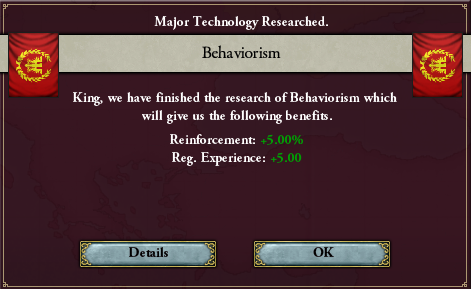
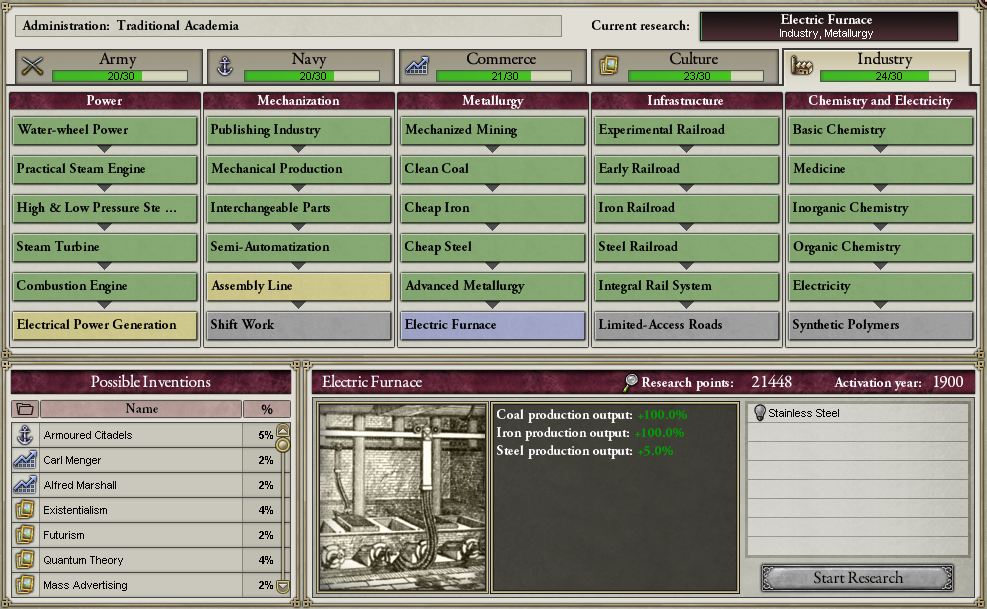
In the rest of the world, Germany accepted a peace with Scandinavia. Not only did they seize Sjaelland, they forced an independent nation of Finland to be established.
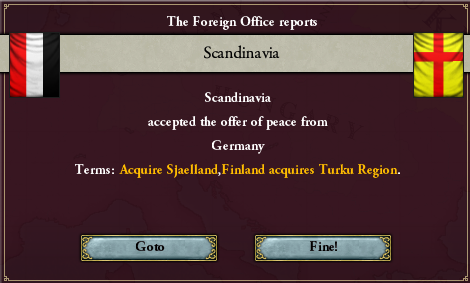
Later in the year, we again had several victorious athletes at the Olympic games.
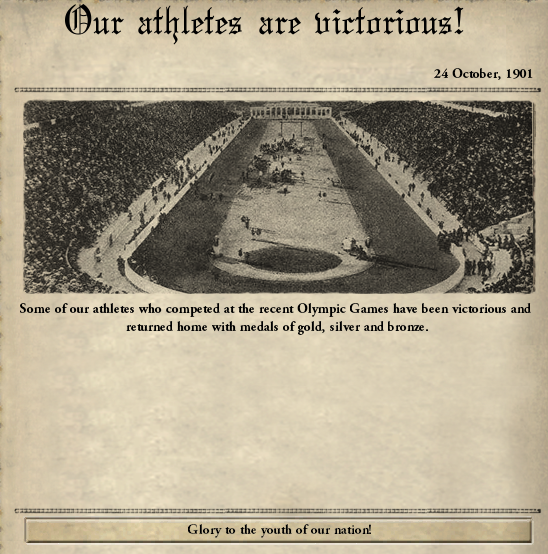
And in December, the typical communist revolt erupted.
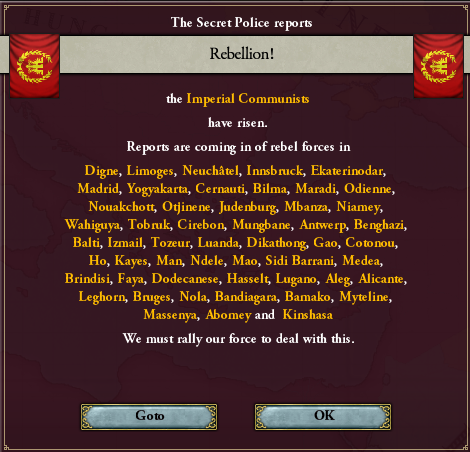
In January 1902, Our attempts to justify claims on Iraq’s colonies was discovered. By May We were able to declare war on them to reclaim the Santa Cruz islands. I. Legio rapidly seized Mosul and Iraq surrendered the islands.
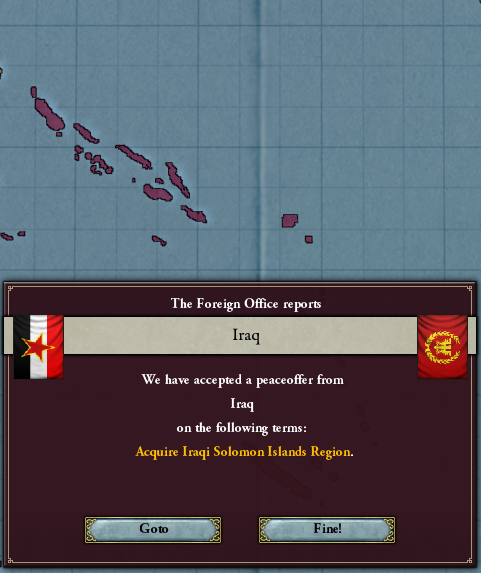
By July, the electric furnaces were ready for production. We then asked the legions to study how modern fortifications might be infiltrated, and to develop offensive and defensive capabilities accordingly.
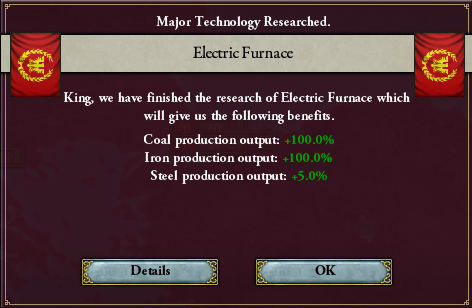
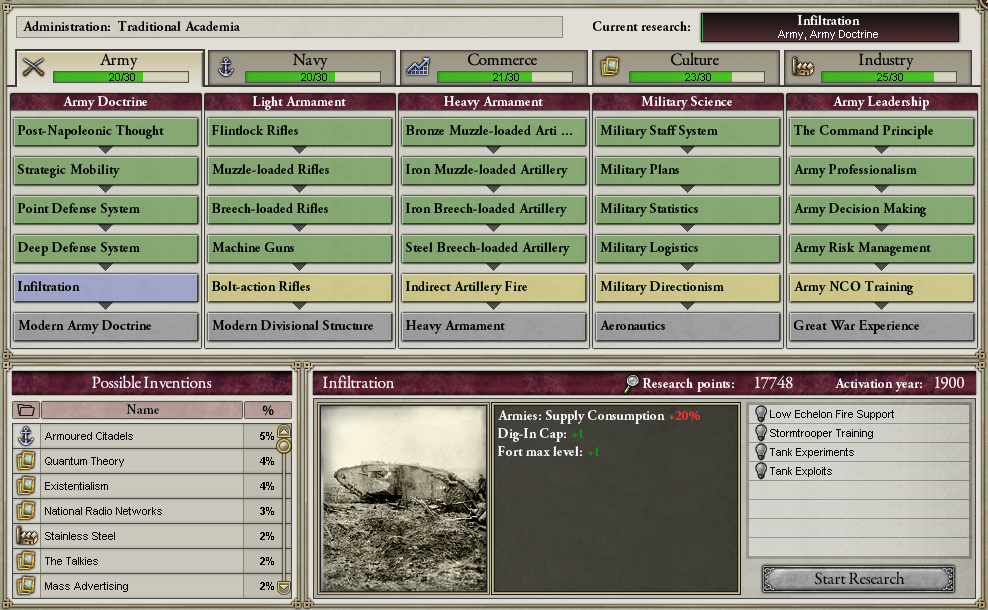
In December, the previously inconsequential city of Olivewood became the center of a growing cinema industry.
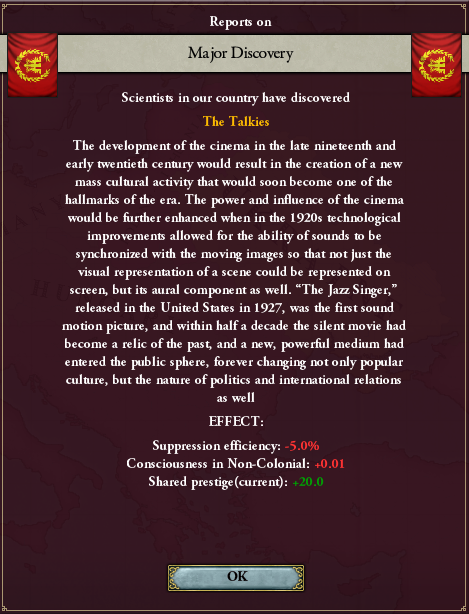
Once the legions had devised these notions, We asked Senator Theodosio to develop a training program for the non-commissioned officers of the legions. Meanwhile, We began a program of upgrading the border defenses.
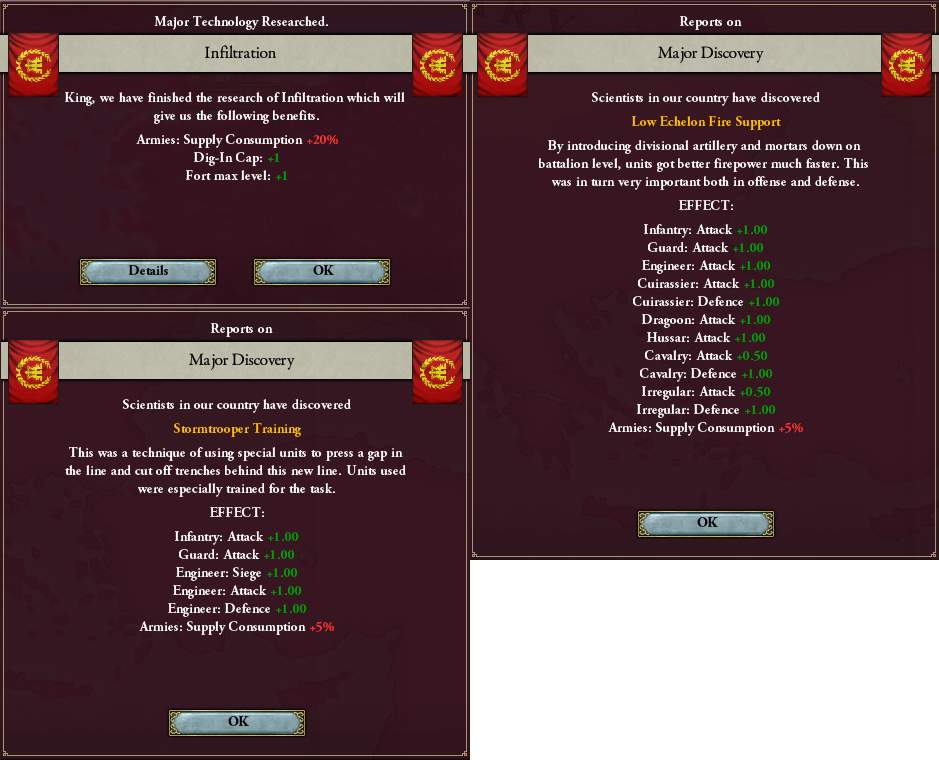
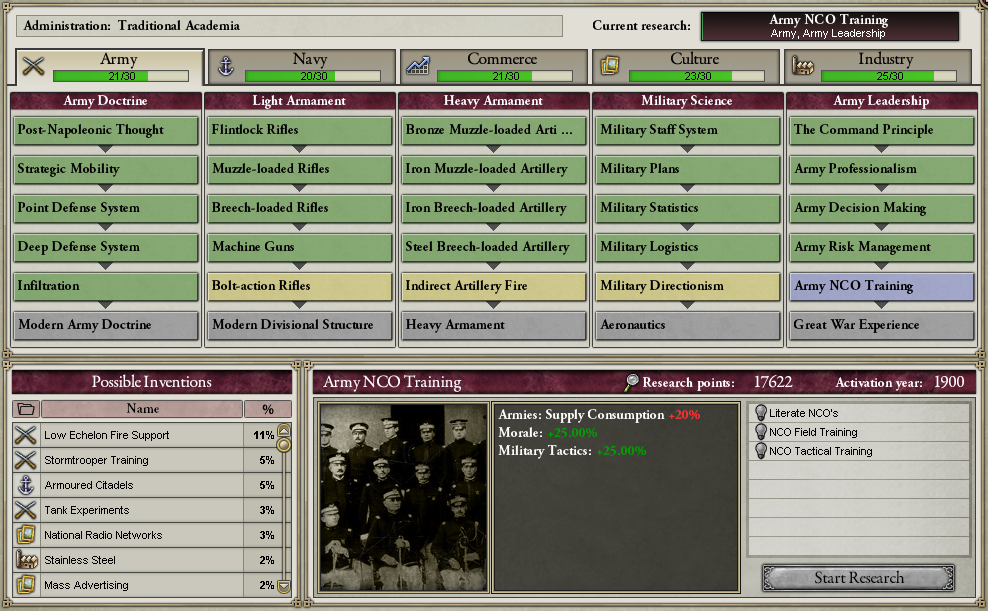
In May of 1903, Jacobin rebels rose up. They were put down within the month.
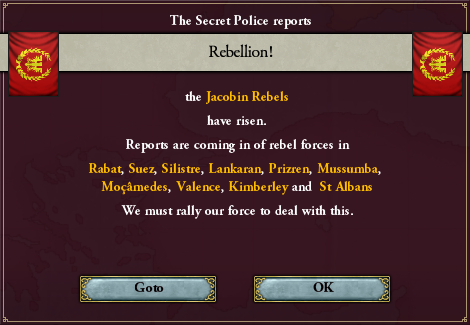
In September, Communists rose up again. They were defeated in early October. We decided to attempt to mollify the communists by creating trade unions for workers to better negotiate with factory owners.
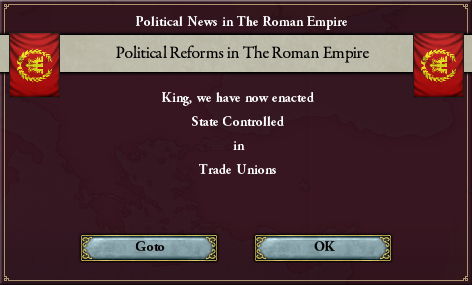
In November, one of Our steamers exploded while in an English port. It was clearly an act of sabotage, and We demanded recompense. When it didn’t come, We declared war on England. They were soon joined by Castile, Adal, and Biru.
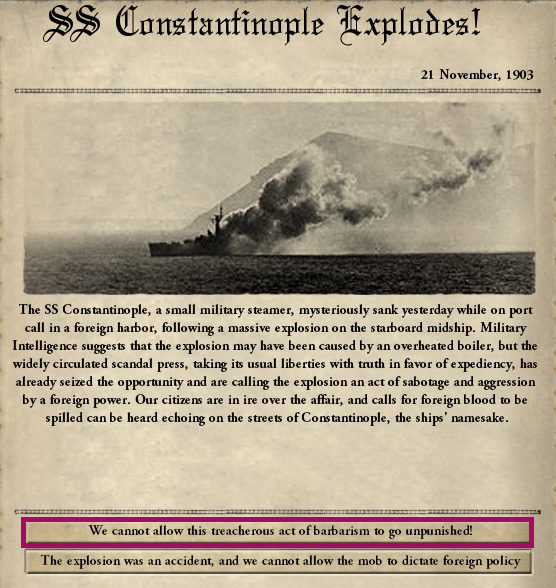
We were less prepared than We had thought. In West Africa, XXXII. Legio and XXXIV. Legio were completely wiped out. We took the opportunity to recruit several more legions in the area.
Senator Theodosio’s training plan came just time during the war, leading to immediate improvements in the Legions’ fighting abilities. We asked him to then work with Senator Palaiologos to procure better armaments for the Legions.
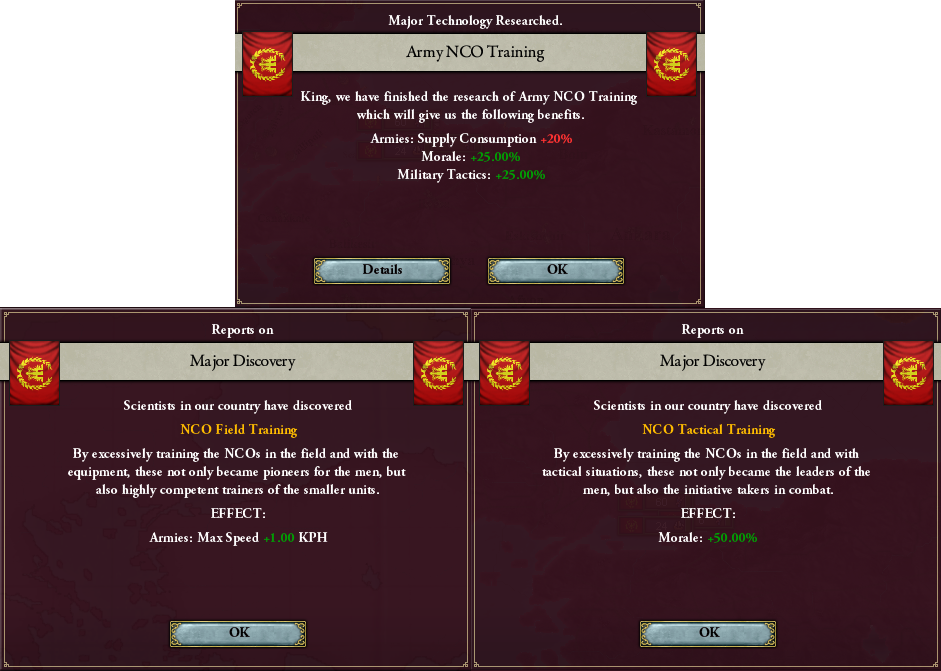
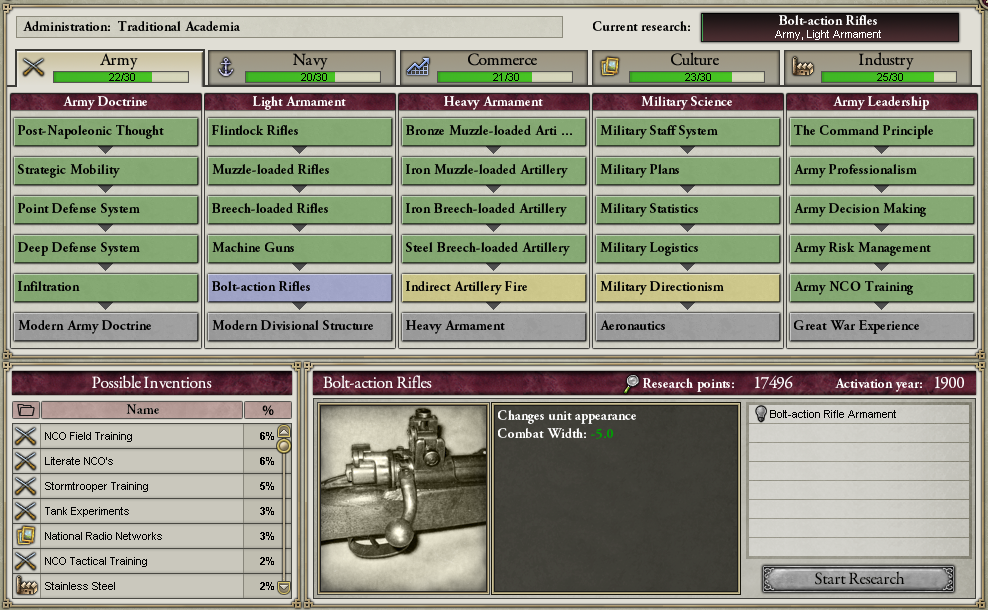
Meanwhile, XIX. Legio was given access through Ethiopia and marched to Adal. They soon convinced Adal to agree to peace. XXV. Legio left Rome on transports and seized the Azores, which convinced Castile to stop fighting. At the same time, the Guyana Fleet and Red Sea Fleet defeated the greater parts of the English and Adal navies. Both fleets lost a cruiser, but sunk dozens of enemy ships in return.
In Africa, XVII. Legio and XXXI. Legio traveled from Tunis and Madrid to smash the English armies, and were aided by Sokoto and the UTA in doing so. XXV. Legio traveled from the Azores and began occupying English territory while the new armies, not yet titled, reclaimed the Imperial lands England had occupied.
In Guyana, XV. Legio had some initial successes, but was soon overwhelmed by sheer numbers and forced to retreat from the mainland. All of Guyana was occupied, as were Trinidad and Tobago. But the Guyana fleet finally won its long engagement with the English navy and trapped the English army on Trinidad. XV. Legio regained Tobago and recovered its strength.
It was at this time that Jacobins chose to rise up, and in greater numbers than the communists ever had. This looked to be the worst rebellion since the Particularist revolt of the early 17th century.
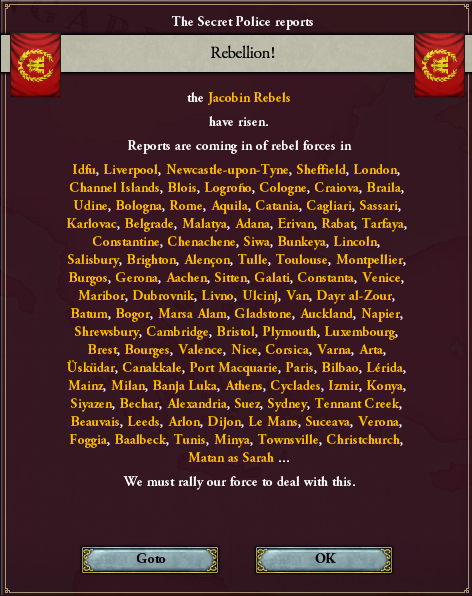
Every legion was thrown into battle. Fortunately, while the rebels were numerous, they were neither well trained nor well equipped. But the English army holding Trinidad was. The attempt to dislodge them failed miserably, and XV. Legio returned to Tobago.
By mid-September, the legions had won numerous victories. Many provinces were free or nearly free from rebel occupation, while the ones being overrun merely waited for the legions to arrive. But then a reactionary revolution arose.
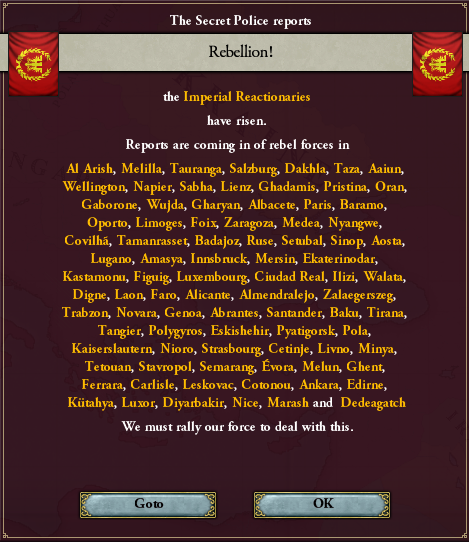
Even still, every day there were reports of several battles won. But there were also reports of cities and regions lost. The legions could not be everywhere at once. Australia had been strategically ignored in favor of New Zealand, for instance. Whether or not that contributed to the Australian Nationalist revolt is unknown. And in the end they will soon be defeated and Australia stabilized, so the importance of what led to that revolt is limited.
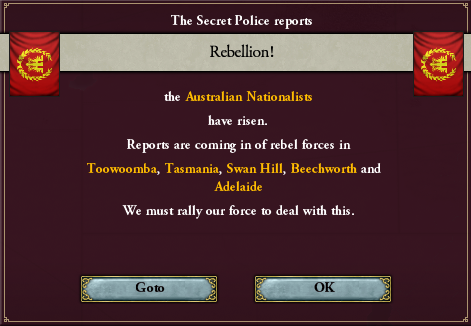
The new rifles secured by Senators Theodosio and Palaiologos gave the legions an even greater edge. They immediately set about securing long range artillery.
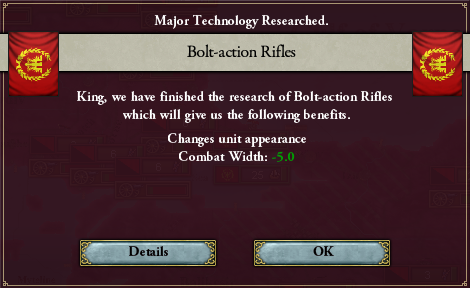
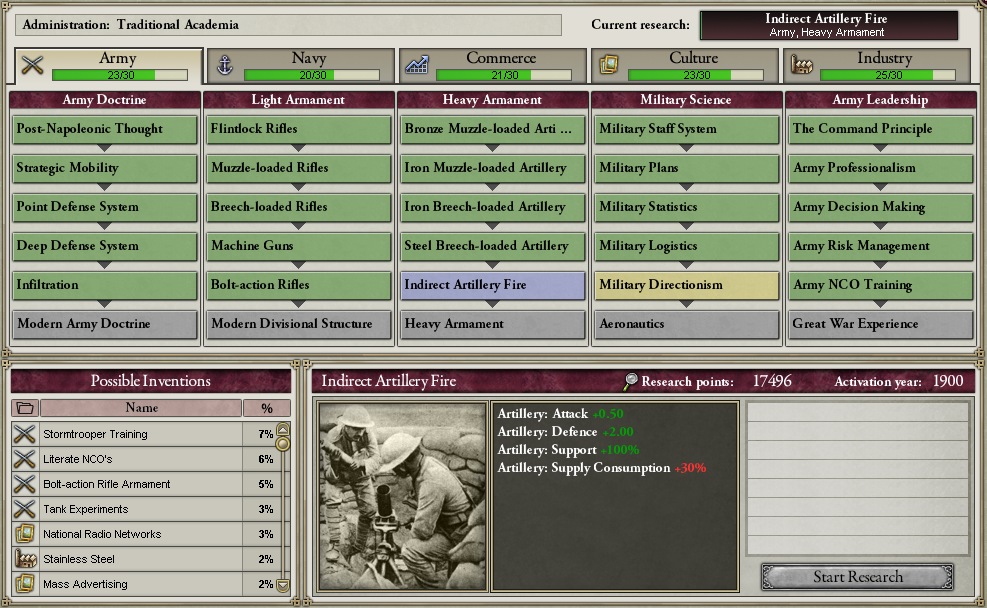
Progress was slow but steady. By mid-October sub-Saharan Africa was completely free from rebel influences. Shortly thereafter, the Levant was also freed. By late November, Iberia was peaceful. New Zealand was pacified in early December, Egypt in late December.
1905 saw the rapid growth of dedicated radio networks. We began the regulation of the various frequencies that could be used.
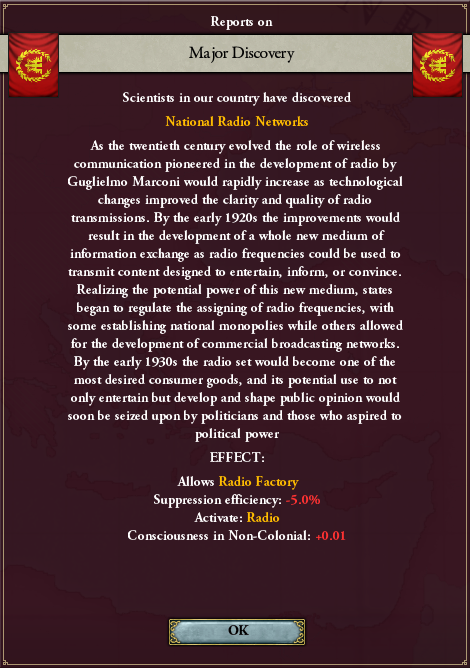
The rebellion was nearly defeated everywhere but Australia by this point. In January, Anatolia, Armenia, Caucasia, and France completely freed from rebel influence, and many other areas freed of all rebel armies. In February, every area outside England, Wales, Macedonia, and Australia was freed, and there were no rebel armies but in Australia. In March, every area outside England and Australia was freed. While there was a little mopping up left to do, the rebellion was now over.
While the rest of the legions recovered and more legions were recruited, XV. Legio brought the war back to England. It recovered Tobago and Trinidad, then seized a beachhead in Guyana. When England refused to attack, they eventually grew impatient and attacked the English armies in Curiappo. But again, English armies were overwhelming and XV. Legio was forced to retreat.
Shortly after that, the legions received their new artillery, and We tasked Senator Theodosio with setting policies that would allow the legions to do their work free of political meddling. Senator Theodosio also introduced a new kind of vehicle for breaking through enemy fortifications. We immediately began building several factories to produce these in quantity.
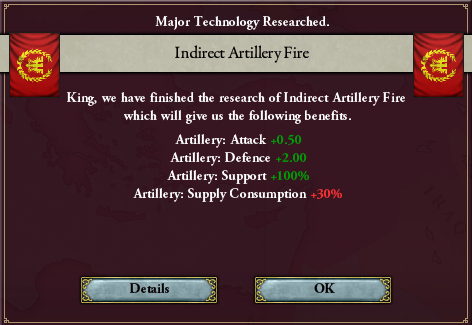
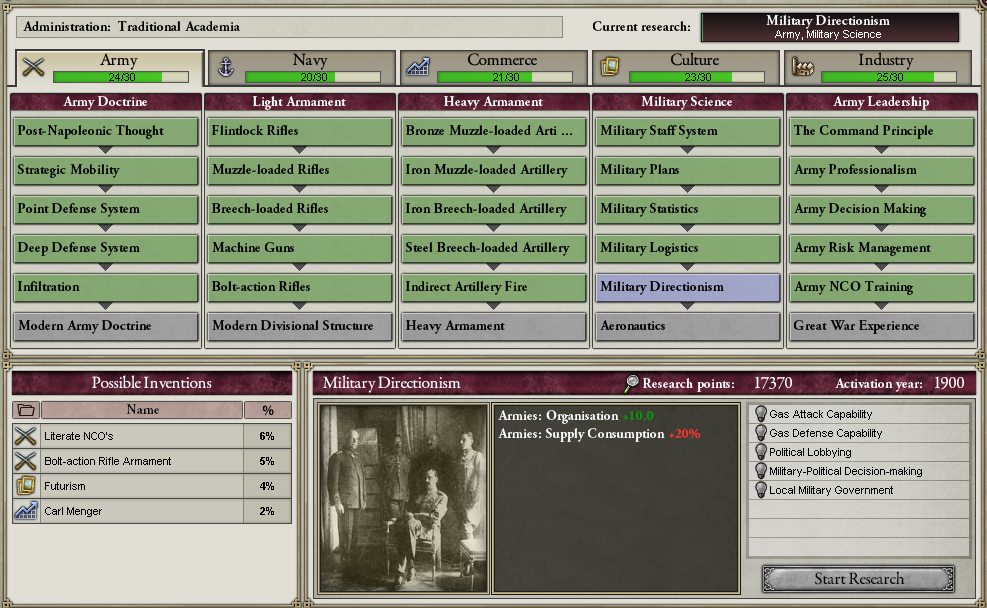
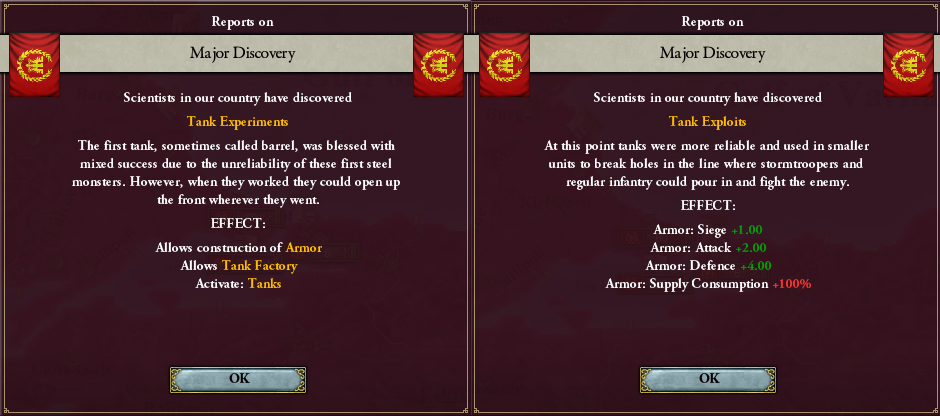
At the end of July, a party calling themselves the Varangian Guard had formed, wishing for the Empire to be strong above all others.
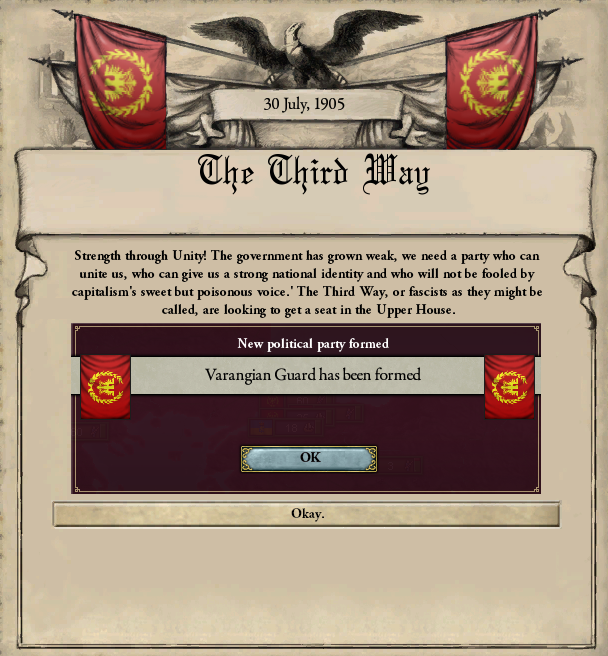
XXV. Legio traveled from Rome to South America, and along with XV. Legio dealt an English army a strong defeat. They began capturing English territory. It is unlikely that England will last for much longer.
Responses
Olivewood…never heard of that town before.
I would like to request a map of the current rebel activities and progress in the war, as my copies were apparently burned when Konstantinians and Jacobins simultaneously stormed my headquarters in Thessaloniki. What I am wondering is why Konstantinians and Jacobins, who oppose each other in every way and ideology, would work together against the government. Seriously, why?!
Before anybody claims that the Ministry of Security was incompetent in preventing the two rebellions from breaking out, I would like to announce that an in-depth investigation of the entire Ministry and Secret Police, myself included, has begun after allegations reached my desk of possible traitors, rebel sympathizers, informants, and potential Cultists within the Ministry hampering its activities. Reports have surfaced of Secret Police officers and Ministry officers defecting to rebel organizations, and I intend to hunt them down and prosecute them to the fullest of the law.
There has been no word from Germany or Hungary on the status of Markos Angelos.- Senator Doukas
These rebels are becoming quite a burden on the empire. Either we need to find the root cause for their desire to rebel, whether dissatisfaction in life or even foreign support, or we need to find ways to keep people appeased and content. They nearly damaged our war effort!
Talking pictures? The ability to transmit messages across the great distances? These wonders will never cease.
- Senator Raphael Favero
Introducing Julius Marco, born in Rome on june 27, 1887.
Born in a wealthy family, he was a devoted historian, mainly in the militaristic side of things, and is also a huge fan of “alternate history”, often creating whole words and timelines with his imagination. Being married in March to Sarah Dystoki and finally, in a drunken pronouncement, he said
“Blast it Gabriel! (BFF of Julius) Im married to the best woman a man can ask for, I have a good house and a kind family, and yet I am not in the forum, discussing with the mighty and majestic people that run this empire ideas to improve it! Because of my cowardice, I missed the chance to talk with Empress Veronica, God Bless Her, and could have provided for the common people rights and luxury! SCREW IT, IM JOINING THE SENATE, AND THERE IS NOT A DAMN THING THATS GOING TO STOP ME!”
He promply filed an entry and was allowed in.
And thus began the career of Julius Marcos, on July 31, 1905.The first day:
“Im so excited! My little boy is joining the senate!”
“Relax mom, I’m just joining the senate! And thats way in Constantinople!”
“Just be glad that nice girl Sarah is coming with you, her dad was quite the angry goth.”
“Im proud of you boyo.”
“Thanks dad.”
Gabriel: SURPRISE!
“What the?”
“Didn’t think you were gonna leave me here now were you, and did you really think I was gonna leave you and Sarah alone to have the sexy times?”
“No…”
“Got my stuff ready to go! The carriage is outside!” We should be there by 4:00!” ((Time is 5:00 in the morning))
“Bye mom, bye dad,”
“We’ll miss you! And give Raphel Favero those cookies I made!”
“Bye!”Enters the carriage
“Hey.”
“Hey yourself, cutie.”
“Giggles Why thank you my good sir,”
“ Alright lovebirds, Im going to rant about how stupid beards are to the driver, and for the love of god DO NOT have fun, if you know what I mean.”
5:00, Constantinople
Well, this is it. walks up the stairs
This is your first day, Julius, LETS DO THIS!
Julius confidently opens up the door, and strolls down the corridor, and walks up to some senators.
“Hi there! Im julius Marco…”
Michael Doukas turns and sees the newcomer.
Well, I wasn’t expecting new senators at this time, but welcome! I am Michael Doukas, Minister of Security, Doux of Greece, Governor of Palestine, creator of the Secret Police, etc. I hope you serve the Empire well (and join the Foederatoi)!
Hello there senator Michael! Thank you for your kindness, although I would prefer not to join the Foederatoi right now, Im still mulling over. Im leaning towards Fascism, but not extremely, I just like the military policy, and so far the economy policy is not too shabby, but don’t expect me to go round yelling about “Aryan races” or stuff like that, I will just be a light Fascist.
That reminds me, I must finish the 1933 year in my WW2 scenario…- Senator Marco
I urge you to choose your allegiances carefully. And what is this “1933 year in WW2 scenario?” Is this some sort of future prediction of yours?
- Senator Doukas
Join the Varangian Guard, Julius. We shall accommodate you to the best of our abilities and make this Empire great!
- Senator Palaiologos
Alexios Angelos, a senator in his mid-30s and from a Greek aristocratic family so old they’d probably claim to have been dining with Justinian, greets Julius Marco with a polite smile.
“Another Latin senator, I see. Good to meet you. Raphael Favero and I represent the leading lights of Patrikioi, those senators with the oldest and noblest of blood. Pay no attention to the fascist in the corner: he is in a minority and thus feels he needs to shout to make up for it.”
Also, beware of the communist from Britannia, he is like the fascist Palaiologos. We in the Foederatoi represent both the old and new nobility, accepting the most talented men into our ranks so that we can work together and benefit the Empire, not run it into the ground like some want to do.
- Senator Doukas
To Micheal: Relax my friend, I am just a fan of the notion of ‘alternate history’ taking points that happened in our timeline and diverging or changing it.
To Palaiolgos:I said, I haven’t made up my mind yet! I like varagian, but the empire is already mighty. Im just afraid of the military failing, as well the economy, it gives me nightmares remembering what happened last time…
Again Mcheal, I may be torn, but I DESPISE communists. I have made extensive readings on the human psyche, and I am afraid that I have come to the conclusion that the the psyche of most humans prevents a decent concept into working decently.
- Senator Marco
My fellow Senators,
I have been spending my time trying to control the rage of all the various Communist factions within our great Empire during this conflict with the English, it is a pity that our fellows throughout the senate were unable to control their own followers.
My Emperor would it be possible for myself to manage the board of the State Trades Union, the General Confederation of Imperial Workers? I feel that our party would be best suited to speak to the common man.
I am glad that our military is now superior to any in the world, but I would like to see our brightest minds focus on the plight of the poorest in our society.
- Senator Gael
Interesting…alternative ways that history could have turned out? Like, for example, the Empire never having been restored and dying a slow and painful death at the hands of Venetians, Turks, and other barbarians? Ha! Good thing that didn’t happen, or the world would be worse off. Anyways, the point is that history went the way that it did, and while it is nice to reflect on hypotheticals and come to appreciate the significance of certain events in history I don’t see any further value in it. You are welcome to share your thoughts with me anytime, though. But let’s focus on more pressing issues.
Markos Angelos is still at large, and I intend to hunt him until he is brought to justice. However, I cannot do this without the cooperation of the Ministry of Security, which has been corrupted by cultists and Konstantinian sympathizers. The investigation into the Ministry of Security is ongoing, but it will take time. Therefore, I strongly urge the Ministry of Intelligence to be careful and increase its vigilance, as it could potentially be similarly compromised. If it is clean of any subversive elements, though, I ask for its assistance in conducting the search for Angelos. The traitor must be found and brought to justice.- Doukas
“What if the Basilissa’s many uncles had had living sons, such that she had not needed to take the throne? What if her predecessor Andronikos had not been mad? So many conclusions can be predicated on so few changes.”
- Senator Angleos
“What if we are in a game as characters played by higher powers for their own amusement and our reality is nothing but a fiction?” No, that would be bordering on philosophy, and I’ll leave that to the Department of Philosophy to handle.
- Senator Doukas
I would hardly consider Venetians barbarians, and I quite take offence to that, for they are part of the Italian people and thus brothers to the Greeks. The two have forged a bond several millennia old, a mutual bond that has benefited us all, and without the Italian people there would be no Rome.
- Senator Raphael Favero
That is exactly why I said that. The Venetians are not barbarians, so any attempt by them to destroy the Empire would be foolish and any story revolving around them doing so would be plain rubbish, as Venetians are absolutely not the enemy of the Empire! Pardon me if I offended you.
- Senator Doukas
Your use of other barbarians implied that both the Venetians and Turks were considered part of that group. I must apologize for I am very defensive of my people. While the Greeks have held the legacy of Rome close and led it to glory, some seem to forget that’s its birthplace is still in Italy and thus they diminish the accomplishment of the Italian people.
- Senator Raphael Favero
Speaking of italians, why is Rome not our capital?
Rome is where this empire began. Rome is the place many great leaders refer to as the ‘Infinite city’. The papacy was given rome, for what other city besides Constantinople could the, back then mighty, leader of the catholic church reside? The ostrogoths and lombards even made Rome the capital of their barbarous nations!
So why, oh why is Rome not the capital?- Senator Marco
My grandfather asked this question in the Senate Session of 1854, or sometime around them, just before the Cult revealed itself to the world in the 5/9 attacks. Well, Constantinople is the Queen of Cities, the largest and most populous city in Europe, and while we are the Roman Empire, it just symbolizes our origins. Rome is not practical as a capital, as it is harder to defend than Constantinople, less populous, farther from the centers of trade in Constantinople, and the Patriarch of Rome would be quite annoyed if he was kicked out of the Vatican. Also, it makes no sense to move our capital when all of us and our government have resided here for centuries. A move to Rome would cause increased instability.
Also, has anybody heard of this book called “Ton Agóna Mou,” supposedly written by Konstantinos? It appears that some fascists are using it as inspiration.
- Senator Doukas
oh… I never thought of that…. Thanks for answering that though, you have solved a burning question in my head that was there for 9 years.
“Ton Agona Mou”? Never heard of it, I will go to the market and see if its on sale.
- Senator Marco
…
I have returned, and yet it is not there. Some of the shopkeepers don’t even know what it is.
Maybe the book is in the black market?- Senator Marco
That is because I as Minister of Security have just yesterday issued an order for the book’s recall until it is reviewed by the Ministry and deemed acceptable for republication, as complaints have arisen that it spreads “subversive ideas” as it is written by Konstantinos.
- Senator Doukas
Clever idea. I would like to read it, It would be interesting to see the mindset of a man such as he.
- Senator Marco
Once the review of the book is completed and it is cleared for republication, I will make sure to give you a copy.
- Senator Doukas
Thank you my good man.
- Senator Marco
“Censoring books? Really? Are we now to be like our western cousins in the Latin Rite? By censoring the written word, you censor the thoughts of man and that is not our remit as senators. We should be focussed on impressing upon all the might of Rome and let others aspire to our ancient and venerable culture, rather than poring over texts like some miserable scribe, eager to cross out a naughty child’s errors.
“Besides which, even if you really do think this to be simply a matter of proper education, that is still not the remit of the Ministry of Security, but instead the Ministry of Education, who are presumably more than capable of handling their own duties.”
- Senator Angelos
Some books Alexios should not exist. How would you feel if a book came out saying your family were descendants of the devil?
And this book does prove a threat from security because I have heard from Micheal about the books ‘subversive ideas’. What if this book found its way into our youth? They would be influenced in extremist ways, and may even resort to fanatical actions for Konstantinos.
spits on ground
So tell me, do you believe this book must be allowed to roam free?
- Senator marco
“Quite apart from the clear ludicrousness of my family name being associated with descent from the Devil, one can always bring legal action against the publishers oreven duel the author. After all, is there not an old saying - never believe anything in politics until it has been officially denied?”
- Senator Angelos
Isn’t the purpose of the Ministry of Security to maintain national security, while the Ministry of Education is to handle textbooks and what to teach children? In any case, this book is NOT meant for children and is DEFINITELY not a textbook. I believe the Ministry of Education would agree with me when I say it must be pulled from publication immediately; I’ve also obtained the necessary forms from the Ministry of Education allowing me to issue this order. It promotes hateful and dangerous ideas, among others the overthrow of the Empress and our new Emperor, the disbanding of the Senate, and a dangerous foreign policy calling for the deaths of minorities and non-Greeks. In the hands of a learned individual, it is useless. But give it to a man who had the misfortune of not having as good of an education…Anyways, I have brought a copy here to analyze and to justify my actions.
He takes out a rather old copy of the book.
This is the original book–my brother’s diary. I had to go through a lot to find it and secure it. Somebody stole this book from Konstantinos’s estate before it was burned down and is now publishing it. I’ve read it myself. You have no idea how dangerous are the ideas inside this book, inside my brother’s mind. I can’t say them out loud. The point is, this is more of a matter of security than education. This book teaches people to hate and to kill. Do you want your sons and brothers to read this book and be converted into Konstantinians? Given to the public, it would cause untold instability and provoke the Konstantinians to revolt again. We just barely put down the last one. Imagine what a rebellion larger than that could do. And imagine what this book could do to our reputation. We, as the most civilized nation, would be seen as the most barbaric in the hate this book spreads. This is the sort of rhetoric that leads to war, and not just any war, a global one, one possibly too large for the Empire to survive. I will not let that happen on my watch. So I have resolved to keep this book out of the public’s reach for its and our own good for now. There is no other option until the reviewing process is over and the book is stripped of subversive elements for good.
But why publish it now? Why not publish it immediately after the rebellion? Something doesn’t seem right here. There must be a reason the book is only being published now.
- Senator Doukas
“The sooner we eliminate minorities and ‘non-Greeks’ the better. Whilst people insist on regional differences and adherences to local customs above those of the Empire as a whole, such differences can be exploited in such a fashion. Panhellenism should be the highest goal of this senate.
“Besides, if that book calls for the overthrow of Imperial authority, then acting upon it is clearly treasonable and should be punished as such. If we already have sufficient legal grounds to ban the book and arrest anyone espousing its philosophies, that is all that needs be done. Saying that the book is worth reading if its treasonous content were simply to be removed is a nonsense and will simply confuse the poor unenlightened masses that you claim are vulnerable to the book in the first place.”
- Senator Angelos
Then I have nothing more to say. The ban on this book shall be extended indefinitely. I will have nobody reading these treasonous ideas!
- Senator Doukas
“That of course includes us, senator. We can’t be exempted from not reading treasonous material simply because we get to debate whether it should be censored or not.”
- Senator Angelos
Well, I haven’t touched the book ever since we started this lovely discussion. You can see that it’s been pushed to the corner of my desk and placed under a lot of papers. This is the original copy; it may yet offer the Ministry of Security clues into the Konstantinians’ motives and activities as well as help in the hunt for Angelos.
But after we find Angelos, this book is to be locked away somewhere in my mansion.- Senator Doukas
EXCUSE ME!?!?!?!
- Senator Marco
“Something of such great importance should not be entrusted to a single senator. I would move that the book be presented to the Basileus and allow him to decide what is done with it. The Imperial family are whom we supposed to be protecting after all.”
“Did you not hear me say that the insistence on certain groups within the Empire not considering themselves to be Greek is harming Imperial unity and leading to just these problems we are experiencing at large? There should in theory be little difference between a Greek-speaking nobleman from Rome and the same from Oceania, yet this is not so and is what is harming our great empire abroad.”
- Senator Angelos
Pardon me Alexios, I thought you actually meant that. I did not hear your speech abut the minorities, sorry.
Hmm, this is actually a good idea. The first real test for the Basileus.
- Senator Marco
We do not like to interject into the Senators’ discussions, but We agree that this book should be repressed. We, like Empress Veronica before us, believe in the free exchange of ideas within the Empire. It is part of what has made us so strong over the last seventy years. But there are some ideas that are dangerous, and it sounds as if this book is full of them. It is important that ideas of these sorts be contained, and that those who are too interested in them are known and stopped from dangerous action. Likewise, it would be best for Us to hold the book once the investigation is complete. Our family is quite experienced at containing dangerous items.
- Emperor Konstantinos
Very well then, Your Imperial Majesty, I shall hand over this book to you then at once. It may have been my brother’s, but it will be much safer in the possession of the Imperial Household.
Michael presents the book to the Emperor for him to keep safe.
Thank god that is over.
What now? It appear that most of the problems are over.
Perhaps strategy for taking care of the russians and overviews of our Ming ally. I’m a sucker for china.- Senator Marco
The Emperor takes the book without glancing at it, but being careful to keep it closed.
Thank you Senator Doukas. We trust you will discover and destroy any other copies. As well, make sure to track who is distributing copies and why. Though We hardly need to tell you how to do your job.
Senator Marco, We have never understood why so many fear Russia. They have only been concerned with Siberia for the last sixty years, ever since they took Karelia and Kola from Scandinavia and the Empire freed Ukraine and parts of the Polish-Lithuanian Commonwealth from their grip. They maintain no claims to the west, and have been quite restrained in Central Asia, despite the aggression of Khiva against its neighbors. We do not believe there is any reason to fear Russia.
Ming has remained stable, but for the Japanese occupation of Shandong. They claim parts of Manchuria currently owned by Japan and Russia, and there may be future wars over these claims. They had been bypassed by the world at large, but they are rapidly modernizing. They are considered a Great Power, largely due to their large military, which is rapidly expanding.
At this time, We would like to review the various government appointments. These are the planned appointments, but if any Senator would wish a different appointment, We would ask them to speak now. As well, We would prefer to hear the preferences of any Senators who do not yet have an appointment before blindly assigning them one. And We would prefer Senators be assigned as the Minister of Intelligence, The Minister of Education, and the Chief of Staff instead of again needing to assign petty bureaucrats to those roles.
Foreign minister - Senator Favero
Armament minister - Senator Palaiologos
Minister of security - Senator Doukas
Minister of intelligence -
Minister of Education -
Chief of Staff -
Chief of the Army - Senator Theodosio
Chief of the Navy - Senator SmithereensRegions for Governors:
(North) Africa -
Armenia -
Asia -
Britannia -
Dalmatia - Heraclius Komnenos
Egypt -
Georgia
Guayana
Macedonia - Senator Angelos
Mauretania
Naples - Senator Septiadis
Palestine - Senator Doukas
Raetia - Senator Comminus
Sicily - Senator Smithereens
Syria -
Thracia - Prince KonstantiosAquitaine (Aquitaine) -
Australia (Greek) -
Azerbaijan (Azerbaijani) -
Belgium (Flemish/Walloon) -
Brittany (Breton) - Senator Gael
Burgundy (Burgundian) -
Catalonia (Andalucian) -
France (Cosmopotitaine) -
Italy (Italian) - Senator Favero
Java (Javan) -
New Zealand (Greek) -
Philippines (Filipino) - Senator Nguyen-Climaco
South Africa (Greek) -
Spain (Castilian/Andalusian) - Senator Theodosio
Wales (Welsh) -
I would like to be governor of britannia. The island has always fascinated me, especially its post-roman history, and it would be nice to be able to do something for quality of living, though I doubt the threat the scottish barbarians propose. Yes, Britannia seems like a nice, calm province to be governor of.
May I be allowed governorship of Brittania my Basileus?- Senator Marco
“Sebasto Basilia, I ask that House Angelos be honoured by my selection as Minister of Education, so that we might spread proper Greek education and culture to the farthest reaches of the Empire and let even the poor natives of Okeania, Afrika and Kanata learn the teachings of Plato, Euclid and Justinian.”
- Senator Angelos
I am content with my current postings. I do not desire them to change at this point.
- Doukas
Closing the Address
Senator Marco, it seems Our records were in error. The Palaiologos family has long been governors of Britannia, and thus they will continue to be so. If you have no objection, We will instead assign you as governor of Wales for now. We have no doubt you will still find the people interesting.
These are thus the final appointments:
Foreign minister - Senator Favero
Armament minister -
Minister of security - Senator Doukas
Minister of intelligence -Senator Palaiologos
Minister of Education - Senator Angelos
Chief of Staff -
Chief of the Army - Senator Theodosio
Chief of the Navy - Senator Smithereens
Regions for Governors:
(North) Africa -
Armenia -
Asia -
Britannia - Senator Palaiologoi
Dalmatia - Senator Komnenos
Egypt -
Georgia
Guayana
Macedonia - Senator Angelos
Mauretania
Naples - Senator Septiadis
Palestine - Senator Doukas
Raetia - Senator Comminus
Sicily - Senator Smithereens
Syria -
Thracia - Prince Konstantios
Aquitaine (Aquitaine) -
Australia (Greek) -
Azerbaijan (Azerbaijani) -
Belgium (Flemish/Walloon) -
Brittany (Breton) - Senator Gael
Burgundy (Burgundian) -
Catalonia (Andalucian) -
France (Cosmopotitaine) -
Italy (Italian) - Senator Favero
Java (Javan) -
New Zealand (Greek) -
Philippines (Filipino) - Senator Nguyen-Climaco
South Africa (Greek) -
Spain (Castilian/Andalusian) - Senator Theodosio
Wales (Welsh) - Senator Marcos
As always Senators, thank you for your time. This session is now closed.
After the Address
((Private))
(Some pages have been torn out of the journal. Much information, except that of the last chapter, has been removed and destroyed, but it is assumed that at some point Dracula attacked Mara and fled back to Carpathia, pursued by Doukas and friends.)
Mara Dalassenos’s Journal
1 November. Somewhere in Carpathia.All day long we have travelled, and at a good speed. The horses seem to know that they are being kindly treated, for they go willingly their full stage at best speed. We have now had so many changes and find the same thing so constantly that we are encouraged to think that the journey will be an easy one. Dr. von Habsburg is laconic, he tells the farmers that he is hurrying to Bistritz, and pays them well to make the exchange of horses. We get hot soup, or coffee, or tea, and off we go. It is a lovely country. Full of beauties of all imaginable kinds, and the people are brave, and strong, and simple, and seem full of nice qualities. They are very, very superstitious. In the first house where we stopped, when the woman who served us saw the scar on my forehead, she crossed herself and put out two fingers towards me, to keep off the evil eye. I believe they went to the trouble of putting an extra amount of garlic into our food, and I can’t abide garlic. Ever since then I have taken care not to take off my hat or veil, and so have escaped their suspicions. We are travelling fast, and as we have no driver with us to carry tales, we go ahead of scandal. But I daresay that fear of the evil eye will follow hard behind us all the way. The Professor seems tireless. All day he would not take any rest, though he made me sleep for a long spell. At sunset time he hypnotized me, and he says I answered as usual, “darkness, lapping water and creaking wood.” So our enemy is still on the river. I am afraid to think of Ioannes, but somehow I have now no fear for him, or for myself. I write this whilst we wait in a farmhouse for the horses to be ready. Dr. Von Habsburg is sleeping. Poor dear, he looks very tired and old and grey, but his mouth is set as firmly as a conqueror’s. Even in his sleep he is intense with resolution. When we have well started I must make him rest whilst I drive. I shall tell him that we have days before us, and he must not break down when most of all his strength will be needed . . . All is ready. We are off shortly.
2 November, morning.
I was successful, and we took turns driving all night. Now the day is on us, bright though cold. There is a strange heaviness in the air. I say heaviness for want of a better word. I mean that it oppresses us both. It is very cold, and only our warm furs keep us comfortable. At dawn Van Helsing hypnotized me. He says I answered “darkness, creaking wood and roaring water,” so the river is changing as they ascend. I do hope that my darling will not run any chance of danger, more than need be, but we are in God’s hands.
2 November, night.–All day long driving. The country gets wilder as we go, and the great spurs of the Carpathians, which at Veresti seemed so far from us and so low on the horizon, now seem to gather round us and tower in front. We both seem in good spirits. I think we make an effort each to cheer the other, in the doing so we cheer ourselves. Dr. Von Habsburg says that by morning we shall reach the Borgo Pass. The houses are very few here now, and the Professor says that the last horse we got will have to go on with us, as we may not be able to change. He got two in addition to the two we changed, so that now we have a rude four-in-hand. The dear horses are patient and good, and they give us no trouble. We are not worried with other travellers, and so even I can drive. We shall get to the Pass in daylight. We do not want to arrive before. So we take it easy, and have each a long rest in turn. Oh, what will tomorrow bring to us? We go to seek the place where my poor darling suffered so much. God grant that we may be guided aright, and that He will deign to watch over my husband and those dear to us both, and who are in such deadly peril. As for me, I am not worthy in His sight. Alas! I am unclean to His eyes, and shall be until He may deign to let me stand forth in His sight as one of those who have not incurred His wrath.Memorandum by Albrecht von Habsburg
4 November.This to my old and true friend John Stavridis, M. D., of Blachernae District, Constantinople, in case I may not see him. It may explain. It is morning, and I write by a fire which all the night I have kept alive, Frau Mara aiding me. It is cold, cold. So cold that the grey heavy sky is full of snow, which when it falls will settle for all winter as the ground is hardening to receive it. It seems to have affected Frau Mara. She has been so heavy of head all day that she was not like herself. She sleeps, and sleeps, and sleeps! She who is usual so alert, have done literally nothing all the day. She even have lost her appetite. She make no entry into her little diary, she who write so faithful at every pause. Something whisper to me that all is not well. However, tonight she is more vif. Her long sleep all day have refresh and restore her, for now she is all sweet and bright as ever. At sunset I try to hypnotize her, but alas! with no effect. The power has grown less and less with each day, and tonight it fail me altogether. Well, God’s will be done, whatever it may be, and whithersoever it may lead!
Now to the historical, for as Frau Mara write not in her stenography, I must, in my cumbrous old fashion, that so each day of us may not go unrecorded.
We got to the Borgo Pass just after sunrise yesterday morning. When I saw the signs of the dawn I got ready for the hypnotism. We stopped our carriage, and got down so that there might be no disturbance. I made a couch with furs, and Mara, lying down, yield herself as usual, but more slow and more short time than ever, to the hypnotic sleep. As before, came the answer, “darkness and the swirling of water.” Then she woke, bright and radiant and we go on our way and soon reach the Pass. At this time and place, she become all on fire with zeal. Some new guiding power be in her manifested, for she point to a road and say, “This is the way.”
“How know you it?” I ask.
“Of course I know it,’ she answer, and with a pause, add, “Have not my Ioannes travelled it and wrote of his travel when he and his Lancers came through?”
At first I think somewhat strange, but soon I see that there be only one such byroad. It is used but little, and very different from the coach road, which is more wide and hard, and more of use.
So we came down this road. When we meet other ways, not always were we sure that they were roads at all, for they be neglect and light snow have fallen, the horses know and they only. I give rein to them, and they go on so patient. By and by we find all the things which Ioannes have note in that wonderful diary of him. Then we go on for long, long hours and hours. At the first, I tell Mara to sleep. She try, and she succeed. She sleep all the time, till at the last, I feel myself to suspicious grow, and attempt to wake her. But she sleep on, and I may not wake her though I try. I do not wish to try too hard lest I harm her. For I know that she have suffer much, and sleep at times be all-in-all to her. I think I drowse myself, for all of sudden I feel guilt, as though I have done something. I find myself bolt up, with the reins in my hand, and the good horses go along jog, jog, just as ever. I look down and find Mara still asleep. It is now not far off sunset time, and over the snow the light of the sun flow in big yellow flood, so that we throw great long shadow on where the mountain rise so steep. For we are going up, and up, and all is oh, so wild and rocky, as though it were the end of the world.
Then I arouse Mara. This time she wake with not much trouble, and then I try to put her to hypnotic sleep. But she sleep not, being as though I were not. Still I try and try, till all at once I find her and myself in dark, so I look round, and find that the sun have gone down. Mara laugh, and I turn and look at her. She is now quite awake, and look so well as I never saw her since that night at Golden Horn when we first enter the Count’s house. I am amaze, and not at ease then. But she is so bright and tender and thoughtful for me that I forget all fear. I light a fire, for we have brought supply of wood with us, and she prepare food while I undo the horses and set them, tethered in shelter, to feed. Then when I return to the fire she have my supper ready. I go to help her, but she smile, and tell me that she have eat already. That she was so hungry that she would not wait. I like it not, and I have grave doubts. But I fear to affright her, and so I am silent of it. She help me and I eat alone, and then we wrap in fur and lie beside the fire, and I tell her to sleep while I watch. But presently I forget all of watching. And when I sudden remember that I watch, I find her lying quiet, but awake, and looking at me with so bright eyes. Once, twice more the same occur, and I get much sleep till before morning. When I wake I try to hypnotize her, but alas! Though she shut her eyes obedient, she may not sleep. The sun rise up, and up, and up, and then sleep come to her too late, but so heavy that she will not wake. I have to lift her up, and place her sleeping in the carriage when I have harnessed the horses and made all ready. Madam still sleep, and she look in her sleep more healthy and more redder than before. And I like it not. And I am afraid, afraid, afraid! I am afraid of all things, even to think but I must go on my way. The stake we play for is life and death, or more than these, and we must not flinch.5 November, morning.
Let me be accurate in everything, for though you and I have seen some strange things together, you may at the first think that I, Von Habsburg, am mad. That the many horrors and the so long strain on nerves has at the last turn my brain.
All yesterday we travel, always getting closer to the mountains, and moving into a more and more wild and desert land. There are great, frowning precipices and much falling water, and Nature seem to have held sometime her carnival. Mara still sleep and sleep. And though I did have hunger and appeased it, I could not waken her, even for food. I began to fear that the fatal spell of the place was upon her, tainted as she is with that Vampire baptism. “Well,” said I to myself, “if it be that she sleep all the day, it shall also be that I do not sleep at night.” As we travel on the rough road, for a road of an ancient and imperfect kind there was, I held down my head and slept.
Again I waked with a sense of guilt and of time passed, and found Mara still sleeping, and the sun low down. But all was indeed changed. The frowning mountains seemed further away, and we were near the top of a steep rising hill, on summit of which was such a castle as Ioannes tell of in his diary. At once I exulted and feared. For now, for good or ill, the end was near.
I woke Mara, and again tried to hypnotize her, but alas! unavailing till too late. Then, ere the great dark came upon us, for even after down sun the heavens reflected the gone sun on the snow, and all was for a time in a great twilight. I took out the horses and fed them in what shelter I could. Then I make a fire, and near it I make Mara, now awake and more charming than ever, sit comfortable amid her rugs. I got ready food, but she would not eat, simply saying that she had not hunger. I did not press her, knowing her unavailingness. But I myself eat, for I must needs now be strong for all. Then, with the fear on me of what might be, I drew a ring so big for her comfort, round where Mara sat. And over the ring I passed some of the wafer, and I broke it fine so that all was well guarded. She sat still all the time, so still as one dead. And she grew whiter and even whiter till the snow was not more pale, and no word she said. But when I drew near, she clung to me, and I could know that the poor soul shook her from head to feet with a tremor that was pain to feel.
I said to her presently, when she had grown more quiet, “Will you not come over to the fire?” for I wished to make a test of what she could. She rose obedient, but when she have made a step she stopped, and stood as one stricken.
“Why not go on?” I asked. She shook her head, and coming back, sat down in her place. Then, looking at me with open eyes, as of one waked from sleep, she said simply, “I cannot!” and remained silent. I rejoiced, for I knew that what she could not, none of those that we dreaded could. Though there might be danger to her body, yet her soul was safe!
Presently the horses began to scream, and tore at their tethers till I came to them and quieted them. When they did feel my hands on them, they whinnied low as in joy, and licked at my hands and were quiet for a time. Many times through the night did I come to them, till it arrive to the cold hour when all nature is at lowest, and every time my coming was with quiet of them. In the cold hour the fire began to die, and I was about stepping forth to replenish it, for now the snow came in flying sweeps and with it a chill mist. Even in the dark there was a light of some kind, as there ever is over snow, and it seemed as though the snow flurries and the wreaths of mist took shape as of women with trailing garments. All was in dead, grim silence only that the horses whinnied and cowered, as if in terror of the worst. I began to fear, horrible fears. But then came to me the sense of safety in that ring wherein I stood. I began too, to think that my imaginings were of the night, and the gloom, and the unrest that I have gone through, and all the terrible anxiety. It was as though my memories of all Ioannes’s horrid experience were befooling me. For the snow flakes and the mist began to wheel and circle round, till I could get as though a shadowy glimpse of those women that would have kissed him. And then the horses cowered lower and lower, and moaned in terror as men do in pain. Even the madness of fright was not to them, so that they could break away. I feared for my dear Mara when these weird figures drew near and circled round. I looked at her, but she sat calm, and smiled at me. When I would have stepped to the fire to replenish it, she caught me and held me back, and whispered, like a voice that one hears in a dream, so low it was.
“No! No! Do not go without. Here you are safe!”
I turned to her, and looking in her eyes said, “But you? It is for you that I fear!”
Whereat she laughed, a laugh low and unreal, and said, “Fear for me! Why fear for me? None safer in all the world from them than I am,” and as I wondered at the meaning of her words, a puff of wind made the flame leap up, and I see the red scar on her forehead. Then, alas! I knew. Did I not, I would soon have learned, for the wheeling figures of mist and snow came closer, but keeping ever without the Holy circle. Then they began to materialize till, if God have not taken away my reason, for I saw it through my eyes. There were before me in actual flesh the same three women that Ioannes saw in the room, when they would have kissed his throat. I knew the swaying round forms, the bright hard eyes, the white teeth, the ruddy color, the voluptuous lips. They smiled ever at poor dear Mara. And as their laugh came through the silence of the night, they twined their arms and pointed to her, and said in those so sweet tingling tones that Ioannes said were of the intolerable sweetness of the water glasses, “Come, sister. Come to us. Come!”
In fear I turned to my poor Mara, and my heart with gladness leapt like flame. For oh! the terror in her sweet eyes, the repulsion, the horror, told a story to my heart that was all of hope. God be thanked she was not, yet of them. I seized some of the firewood which was by me, and holding out some of the Wafer, advanced on them towards the fire. They drew back before me, and laughed their low horrid laugh. I fed the fire, and feared them not. For I knew that we were safe within the ring, which she could not leave no more than they could enter. The horses had ceased to moan, and lay still on the ground. The snow fell on them softly, and they grew whiter. I knew that there was for the poor beasts no more of terror.
And so we remained till the red of the dawn began to fall through the snow gloom. I was desolate and afraid, and full of woe and terror. But when that beautiful sun began to climb the horizon life was to me again. At the first coming of the dawn the horrid figures melted in the whirling mist and snow. The wreaths of transparent gloom moved away towards the castle, and were lost.
Instinctively, with the dawn coming, I turned to Mara, intending to hypnotize her. But she lay in a deep and sudden sleep, from which I could not wake her. I tried to hypnotize through her sleep, but she made no response, none at all, and the day broke. I fear yet to stir. I have made my fire and have seen the horses, they are all dead. Today I have much to do here, and I keep waiting till the sun is up high. For there may be places where I must go, where that sunlight, though snow and mist obscure it, will be to me a safety.
I will strengthen me with breakfast, and then I will do my terrible work. Mara still sleeps, and God be thanked! She is calm in her sleep . . .Ioannes Dalassenos’s Journal
4 November, evening.The accident to the launch has been a terrible thing for us. Only for it we should have overtaken the boat long ago, and by now my dear Mina would have been free. I fear to think of her, off on the wolds near that horrid place. We have got horses, and we follow on the track. I note this whilst Godalming is getting ready. We have our arms. The Szgany must look out if they mean to fight. Oh, if only Quintus and Stavridis were with us. We must only hope! If I write no more Goodby Mara! God bless and keep you.
Dr. Stavridis’s Diary
5 November.With the dawn we saw the body of Szgany before us dashing away from the river with their leiter wagon. They surrounded it in a cluster, and hurried along as though beset. The snow is falling lightly and there is a strange excitement in the air. It may be our own feelings, but the depression is strange. Far off I hear the howling of wolves. The snow brings them down from the mountains, and there are dangers to all of us, and from all sides. The horses are nearly ready, and we are soon off. We ride to death of some one. God alone knows who, or where, or what, or when, or how it may be . . .
Dr. von Habsburg’s Memorandum
5 November, afternoon.I am at least sane. Thank God for that mercy at all events, though the proving it has been dreadful. When I left Mara sleeping within the Holy circle, I took my way to the castle. The blacksmith hammer which I took in the carriage from Veresti was useful, though the doors were all open I broke them off the rusty hinges, lest some ill intent or ill chance should close them, so that being entered I might not get out. Ioannes’s bitter experience served me here. By memory of his diary I found my way to the old chapel, for I knew that here my work lay. The air was oppressive. It seemed as if there was some sulphurous fume, which at times made me dizzy. Either there was a roaring in my ears or I heard afar off the howl of wolves. Then I bethought me of my dear Mara, and I was in terrible plight. The dilemma had me between his horns.
Her, I had not dare to take into this place, but left safe from the Vampire in that Holy circle. And yet even there would be the wolf! I resolve me that my work lay here, and that as to the wolves we must submit, if it were God’s will. At any rate it was only death and freedom beyond. So did I choose for her. Had it but been for myself the choice had been easy, the maw of the wolf were better to rest in than the grave of the Vampire! So I make my choice to go on with my work.
I knew that there were at least three graves to find, graves that are inhabit. So I search, and search, and I find one of them. She lay in her Vampire sleep, so full of life and voluptuous beauty that I shudder as though I have come to do murder. Ah, I doubt not that in the old time, when such things were, many a man who set forth to do such a task as mine, found at the last his heart fail him, and then his nerve. So he delay, and delay, and delay, till the mere beauty and the fascination of the wanton Undead have hypnotize him. And he remain on and on, till sunset come, and the Vampire sleep be over. Then the beautiful eyes of the fair woman open and look love, and the voluptuous mouth present to a kiss, and the man is weak. And there remain one more victim in the Vampire fold. One more to swell the grim and grisly ranks of the Undead! . . .
There is some fascination, surely, when I am moved by the mere presence of such an one, even lying as she lay in a tomb fretted with age and heavy with the dust of centuries, though there be that horrid odor such as the lairs of the Count have had. Yes, I was moved. I, Von Habsburg, with all my purpose and with my motive for hate. I was moved to a yearning for delay which seemed to paralyze my faculties and to clog my very soul. It may have been that the need of natural sleep, and the strange oppression of the air were beginning to overcome me. Certain it was that I was lapsing into sleep, the open eyed sleep of one who yields to a sweet fascination, when there came through the snow-stilled air a long, low wail, so full of woe and pity that it woke me like the sound of a clarion. For it was the voice of my dear Madam Mina that I heard.
Then I braced myself again to my horrid task, and found by wrenching away tomb tops one other of the sisters, the other dark one. I dared not pause to look on her as I had on her sister, lest once more I should begin to be enthrall. But I go on searching until, presently, I find in a high great tomb as if made to one much beloved that other fair sister which, like Jonathan I had seen to gather herself out of the atoms of the mist. She was so fair to look on, so radiantly beautiful, so exquisitely voluptuous, that the very instinct of man in me, which calls some of my sex to love and to protect one of hers, made my head whirl with new emotion. But God be thanked, that soul wail of my dear Mara had not died out of my ears. And, before the spell could be wrought further upon me, I had nerved myself to my wild work. By this time I had searched all the tombs in the chapel, so far as I could tell. And as there had been only three of these Undead phantoms around us in the night, I took it that there were no more of active Undead existent. There was one great tomb more lordly than all the rest. Huge it was, and nobly proportioned. On it was but one word.
DRACULA
This then was the Undead home of the King Vampire, to whom so many more were due. Its emptiness spoke eloquent to make certain what I knew. Before I began to restore these women to their dead selves through my awful work, I laid in Dracula’s tomb some of the Wafer, and so banished him from it, Undead, for ever.
Then began my terrible task, and I dreaded it. Had it been but one, it had been easy, comparative. But three! To begin twice more after I had been through a deed of horror. For it was terrible with the sweet Frau Loukia, what would it not be with these strange ones who had survived through centuries, and who had been strengthened by the passing of the years. Who would, if they could, have fought for their foul lives . . .
Oh, my friend John, but it was butcher work. Had I not been nerved by thoughts of other dead, and of the living over whom hung such a pall of fear, I could not have gone on. I tremble and tremble even yet, though till all was over, God be thanked, my nerve did stand. Had I not seen the repose in the first place, and the gladness that stole over it just ere the final dissolution came, as realization that the soul had been won, I could not have gone further with my butchery. I could not have endured the horrid screeching as the stake drove home, the plunging of writhing form, and lips of bloody foam. I should have fled in terror and left my work undone. But it is over! And the poor souls, I can pity them now and weep, as I think of them placid each in her full sleep of death for a short moment ere fading. For, friend John, hardly had my knife severed the head of each, before the whole body began to melt away and crumble into its native dust, as though the death that should have come centuries agone had at last assert himself and say at once and loud, “I am here!”
Before I left the castle I so fixed its entrances that never more can the Count enter there Undead.
When I stepped into the circle where Mara slept, she woke from her sleep and, seeing me, cried out in pain that I had endured too much.
“Come!” she said, “come away from this awful place! Let us go to meet my husband who is, I know, coming towards us.” She was looking thin and pale and weak. But her eyes were pure and glowed with fervor. I was glad to see her paleness and her illness, for my mind was full of the fresh horror of that ruddy vampire sleep.
And so with trust and hope, and yet full of fear, we go eastward to meet our friends, and him, whom Madam Mina tell me that she know are coming to meet us.Mara Dalassenos’s Journal
6 November.It was late in the afternoon when the Professor and I took our way towards the east whence I knew Ioannes was coming. We did not go fast, though the way was steeply downhill, for we had to take heavy rugs and wraps with us. We dared not face the possibility of being left without warmth in the cold and the snow. We had to take some of our provisions too, for we were in a perfect desolation, and so far as we could see through the snowfall, there was not even the sign of habitation. When we had gone about a mile, I was tired with the heavy walking and sat down to rest. Then we looked back and saw where the clear line of Dracula’s castle cut the sky. For we were so deep under the hill whereon it was set that the angle of perspective of the Carpathian mountains was far below it. We saw it in all its grandeur, perched a thousand feet on the summit of a sheer precipice, and with seemingly a great gap between it and the steep of the adjacent mountain on any side. There was something wild and uncanny about the place. We could hear the distant howling of wolves. They were far off, but the sound, even though coming muffled through the deadening snowfall, was full of terror. I knew from the way Dr. Von Habsburg was searching about that he was trying to seek some strategic point, where we would be less exposed in case of attack. The rough roadway still led downwards. We could trace it through the drifted snow.
In a little while the Professor signalled to me, so I got up and joined him. He had found a wonderful spot, a sort of natural hollow in a rock, with an entrance like a doorway between two boulders. He took me by the hand and drew me in.
“Zee!” he said, “here du vill be in shelter. Und if zhe volves do komm ich kann meet zhem eine by eine.”
He brought in our furs, and made a snug nest for me, and got out some provisions and forced them upon me. But I could not eat, to even try to do so was repulsive to me, and much as I would have liked to please him, I could not bring myself to the attempt. He looked very sad, but did not reproach me. Taking his field glasses from the case, he stood on the top of the rock, and began to search the horizon.
Suddenly he called out, “Look! Frau Mara, look! Look!”
I sprang up and stood beside him on the rock. He handed me his glasses and pointed. The snow was now falling more heavily, and swirled about fiercely, for a high wind was beginning to blow. However, there were times when there were pauses between the snow flurries and I could see a long way round. From the height where we were it was possible to see a great distance. And far off, beyond the white waste of snow, I could see the river lying like a black ribbon in kinks and curls as it wound its way. Straight in front of us and not far off, in fact so near that I wondered we had not noticed before, came a group of mounted men hurrying along. In the midst of them was a cart, a long leiter wagon which swept from side to side, like a dog’s tail wagging, with each stern inequality of the road. Outlined against the snow as they were, I could see from the men’s clothes that they were peasants or gypsies of some kind.
On the cart was a great square chest. My heart leaped as I saw it, for I felt that the end was coming. The evening was now drawing close, and well I knew that at sunset the Thing, which was till then imprisoned there, would take new freedom and could in any of many forms elude pursuit. In fear I turned to the Professor. To my consternation, however, he was not there. An instant later, I saw him below me. Round the rock he had drawn a circle, such as we had found shelter in last night.
When he had completed it he stood beside me again saying, “At least du shall be safe here from him!” He took the glasses from me, and at the next lull of the snow swept the whole space below us. “Zee,” he said, “zhey komm quickly. Zhey are flogging zhe horses, und galloping as hard as zhey kann.”
He paused and went on in a hollow voice, “They are racing for the sunset. We may be too late. God’s will be done!” Down came another blinding rush of driving snow, and the whole landscape was blotted out. It soon passed, however, and once more his glasses were fixed on the plain.
Then came a sudden cry, “Look! Look! Look! See, two horsemen follow fast, coming up from the south. It must be Markos and John. Take the glass. Look before the snow blots it all out!” I took it and looked. The two men might be Dr. Stavridis and Mr. Quintus. I knew at all events that neither of them was Ioannes. At the same time I knew that Ioannes was not far off. Looking around I saw on the north side of the coming party two other men, riding at breakneck speed. One of them I knew was Ioannes, wearing his uniform, and the other I took, of course, to be Senator Doukas. They too, were pursuing the party with the cart. When I told the Professor he shouted in glee like a schoolboy, and after looking intently till a snow fall made sight impossible, he laid his Blachernae rifle ready for use against the boulder at the opening of our shelter.
“Zhey are all converging,” he said. “Vhen zhe time komms ve shall have gypsies on all sides.” I got out my revolver ready to hand, for whilst we were speaking the howling of wolves came louder and closer. When the snow storm abated a moment we looked again. It was strange to see the snow falling in such heavy flakes close to us, and beyond, the sun shining more and more brightly as it sank down towards the far mountain tops. Sweeping the glass all around us I could see here and there dots moving singly and in twos and threes and larger numbers. The wolves were gathering for their prey.
Every instant seemed an age whilst we waited. The wind came now in fierce bursts, and the snow was driven with fury as it swept upon us in circling eddies. At times we could not see an arm’s length before us. But at others, as the hollow sounding wind swept by us, it seemed to clear the air space around us so that we could see afar off. We had of late been so accustomed to watch for sunrise and sunset, that we knew with fair accuracy when it would be. And we knew that before long the sun would set. It was hard to believe that by our watches it was less than an hour that we waited in that rocky shelter before the various bodies began to converge close upon us. The wind came now with fiercer and more bitter sweeps, and more steadily from the north. It seemingly had driven the snow clouds from us, for with only occasional bursts, the snow fell. We could distinguish clearly the individuals of each party, the pursued and the pursuers. Strangely enough those pursued did not seem to realize, or at least to care, that they were pursued. They seemed, however, to hasten with redoubled speed as the sun dropped lower and lower on the mountain tops.
Closer and closer they drew. The Professor and I crouched down behind our rock, and held our weapons ready. I could see that he was determined that they should not pass. One and all were quite unaware of our presence.
All at once two voices shouted out to, “Halt!” One was my Ioannes’s, raised in a high key of passion. The other Mr. Quintus’ strong resolute tone of quiet command. The gypsies may not have known the language, but there was no mistaking the tone, in whatever tongue the words were spoken. Instinctively they reined in, and at the instant Senator Doukas and Ioannes dashed up at one side and Dr. Stavridis and Mr. Quintus on the other. The leader of the gypsies, a splendid looking fellow who sat his horse like a centaur, waved them back, and in a fierce voice gave to his companions some word to proceed. They lashed the horses which sprang forward. But the four men raised their Blachernae rifles, and in an unmistakable way commanded them to stop. At the same moment Dr. Von Habsburg and I rose behind the rock and pointed our weapons at them. Seeing that they were surrounded the men tightened their reins and drew up. The leader turned to them and gave a word at which every man of the gypsy party drew what weapon he carried, knife or pistol, and held himself in readiness to attack. Issue was joined in an instant.
The leader, with a quick movement of his rein, threw his horse out in front, and pointed first to the sun, now close down on the hill tops, and then to the castle, said something which I did not understand. For answer, all four men of our party threw themselves from their horses and dashed towards the cart. I should have felt terrible fear at seeing Ioannes in such danger, but that the ardor of battle must have been upon me as well as the rest of them. I felt no fear, but only a wild, surging desire to do something. Seeing the quick movement of our parties, the leader of the gypsies gave a command. His men instantly formed round the cart in a sort of undisciplined endeavor, each one shouldering and pushing the other in his eagerness to carry out the order.
In the midst of this I could see that Ioannes on one side of the ring of men, and Markos on the other, were forcing a way to the cart. It was evident that they were bent on finishing their task before the sun should set. Nothing seemed to stop or even to hinder them. Neither the levelled weapons nor the flashing knives of the gypsies in front, nor the howling of the wolves behind, appeared to even attract their attention. Ioannes’s impetuosity, and the manifest singleness of his purpose, seemed to overawe those in front of him. Instinctively they cowered aside and let him pass. In an instant he had jumped upon the cart, and with a strength which seemed incredible, raised the great box, and flung it over the wheel to the ground. In the meantime, Mr. Quintus had had to use force to pass through his side of the ring of Szgany, but he was stabbed and forced to retreat, dropping his knife. All the time I had been breathlessly watching Ioannes I had, with the tail of my eye, seen him pressing desperately forward, and had seen the knives of the gypsies flash as he won a way through them, and they cut at him. Markos had parried with his great bowie knife, and at first I thought that he too had come through in safety. But as he sprang beside Ioannes, who had by now jumped from the cart, I could see that with his left hand he was clutching at his side, and that the blood was spurting through his fingers. Though he did not delay in spite of this, I stepped in to help him. While he, with desperate energy, attacked one end of the chest, attempting to prize off the lid with his great Kukri knife, I attacked the other frantically with his dropped Cherokee knife. Under our efforts the lid began to yield. The nails drew with a screeching sound, and the top of the box was thrown back.
By this time the gypsies, seeing themselves covered by the Blachernaes, and at the mercy of Senator Doukas and Dr. Stavridis, had given in and made no further resistance. The sun was almost down on the mountain tops, and the shadows of the whole group fell upon the snow. I saw the Count lying within the box upon the earth, some of which the rude falling from the cart had scattered over him. He was deathly pale, just like a waxen image, and the red eyes glared with the horrible vindictive look which I knew so well.
As I looked, the eyes saw the sinking sun, and the look of hate in them turned to triumph.
But, on the instant, came the sweep and flash of Jonathan’s great knife. I shrieked as I saw it shear through the throat. Whilst at the same moment my bowie knife plunged into the heart and Doukas fired a bullet into his head, his talented aim not failing him now.
It was like a miracle, but before our very eyes, and almost in the drawing of a breath, the whole body crumbled into dust and passed from our sight.
I shall be glad as long as I live that even in that moment of final dissolution, there was in the face a look of peace, such as I never could have imagined might have rested there.
The Castle of Dracula now stood out against the red sky, and every stone of its broken battlements was articulated against the light of the setting sun.
The gypsies, taking us as in some way the cause of the extraordinary disappearance of the dead man, turned, without a word, and rode away as if for their lives. Those who were unmounted jumped upon the leiter wagon and shouted to the horsemen not to desert them. The wolves, which had withdrawn to a safe distance, followed in their wake, leaving us alone.
Mr. Quintus, who had sunk to the ground, leaned on his elbow, holding his hand pressed to his side. The blood still gushed through his fingers. I flew to him, for the Holy circle did not now keep me back, so did the two doctors. Ioannes knelt behind him and the wounded man laid back his head on his shoulder. With a sigh he took, with a feeble effort, my hand in that of his own which was unstained.
He must have seen the anguish of my heart in my face, for he smiled at me and said, “I am only too happy to have been of service! Oh, God!” he cried suddenly, struggling to a sitting posture and pointing to me. “It was worth for this to die! Look! Look!”
The sun was now right down upon the mountain top, and the red gleams fell upon my face, so that it was bathed in rosy light. With one impulse the men sank on their knees and a deep and earnest “Amen” broke from all as their eyes followed the pointing of his finger.
The dying man spoke, “Now God be thanked that all has not been in vain! See! The snow is not more stainless than her forehead! The curse has passed away!”
And, to our bitter grief, with a smile and in silence, he died, a gallant gentleman and a brave Roman.Note
[NUMBER TORN OUT] years ago we all went through the flames. And the happiness of some of us since then is, we think, well worth the pain we endured. It is an added joy to Mara and to me that our boy’s birthday is the same day as that on which Markos Quintus died. His mother holds, I know, the secret belief that some of our brave friend’s spirit has passed into him. His bundle of names links all our little band of men together. We just call him Markos.
In the summer of this year we made a journey to Carpathia, and went over the old ground which was, and is, to us so full of vivid and terrible memories. It was almost impossible to believe that the things which we had seen with our own eyes and heard with our own ears were living truths. Every trace of all that had been was blotted out. The castle stood as before, reared high above a waste of desolation.
When we got home we were talking of the old time, which we could all look back on without despair, for Doukas and Stavridis are both happily married, and in Doukas’s case remarried; the Senator seems to have overcome the deaths of his father, mother, and wife by now. He seems quite full of energy again, just as he was before his brother’s rebellion. I took the papers from the safe where they had been ever since our return so long ago. We were struck with the fact, that in all the mass of material of which the record is composed, there is hardly one authentic document. Nothing but a mass of typewriting, except the later notebooks of Mara and Stavridis and myself, and Von Habsburg’s memorandum. We could hardly ask any one, even did we wish to, to accept these as proofs of so wild a story. Von Habsburg summed it all up as he said, with our boy on his knee and Doukas’s son Niketas, slightly older than Markos, listening nearby.
“Ve vant nicht proofs. Ve ask none zo believe us! Zhis kinder vill some day know vhat a brave und gallant voman his mother ist. Already he knows her sweetness und loving care. Later on he vill understand how some men so loved her, zhat zhey did dare much fur her sake.
IOANNES DALASSENOS, STRATEGOS, MEMBER OF THE GENERAL STAFF, AND COMMANDER OF THE SECOND ATHENIAN LANCERS
((Also private - time for more exposition on the Cult!))
Meanwhile in Samarkand…
Kira closed her eyes as the bitter, sweet-sour taste of the bhang lassi slid into her mouth. Her body recognized it, like a sudden dryness in the throat and tongue that increased even as she drank. Yogurt and ice water, sugar… and hemp resin and poppy juice and things less common. Slowly, she set the silver cup down on the rock beside her and sat on the flat cushion, cross-legged, with each foot resting sole up on the opposite knee, her hands resting on her thighs with index finger touching thumb. Breath and heartbeat slowed, matching the thudding of a distant drum.
“See. See the Path.” Ignatieff’s voice boomed out like a brazen radong-trumpet, echoing on stone and down the corridors that burrowed more deeply into the earth. “Tell. Tell us the Path.”
Her master spoke Hindi for the benefit of the men who knelt ranked before her. It was damp and chilly in the chambers beneath the ancient temple; great roots wove through the stone of the walls, writhing like snakes. Voices chanted in the background, a deep rumble that echoed off stone like the flickering light of the ghee-fed lamps that cast yellow highlights. It made the faint, faded images painted on the walls seem to move of themselves, whirling around the great room in a sinuous dance.
The drug was not needful, for ordinary purposes—for sensing where a patrol would turn, or what would come of taking one pass and not the next. When she slept, eventually, she would pay for the drink in a torrent of unasked, unsought vision. For the present, it opened the gates of the mind, letting the trained will range farther, and faster.
Her eyelids drooped over the blue-rimmed green of her eyes. Lips opened. Sight blurred, but not as an ordinary woman’s might. Here the outlines shifted as she saw the if; this man might be here, or there, might lean forward or sit straight. He might not be here at all, or might be slightly different… now she saw Ignatieff with eyes of the same color and no patch, now with a steel hook in the place of a hand. Now an Ignatieff who did not command, but smiled a reptile’s smile, while she answered with the same expression… that one was very bad, and she wrenched her mind away.
“See! Speak!”
Might-be frayed out in either direction, to pasts and futures, being and not-being all at once. A future in which buildings stood impossibly tall, sheathed in mirror; one in which nothing lived save insects and grass and only shaped stones remained of humanity; one present in which dark soldiers with strange, powerful weapons and crawling metal fortresses fought here in the wilds of Central Asia.
“I see… I see .. .”
Forward, a part of the fan of might-be collapsed into a knot. She recognized it. The nations of the world going up in flames as men and their machines fought each other, killed each other, large guns lobbing projectiles farther than she had ever seen before, ships sailing underwater, flying machines dropping bombs on cities, large behemoths trudging across desolate trench-scarred landscapes impervious to bullets, death and destruction everywhere. The rivers ran red with blood, the buildings were reduced to jagged hunks of charred rubble, and large mushroom-shaped clouds loomed over the ruins of devastated cities all over the world. And then…a thing twisting in space, its dark pitted bulk rolling ponderous against the stars—there was no reference point to show its size, but she sensed a hugeness about it, an utter cold, a metallic tang as of iron. Like a mountain of frozen steel, falling from forever. Then a blue curve marked with the shapes of continents beneath drifting cloud; a flash of fire, night darker than night, a blizzard that blew ice like swords over seas frozen from pole to pole, a last emaciated body crouching in a ruin gnawing at a human skull.
“It comes… closer.” The fingers of her mind stroked the webs of might-be and if. ”The one slain. His death brings it closer.” A small brown man’s hands, reaching for a bag that twisted in the air. “Closer. But the—”
She stifled a shriek. “Their faces! I see their faces!” A man and a woman’s much alike. Young. The man wearing a Roman military uniform and carrying the seal of the Doukas family, the woman sitting at a strange typing device. Then another man, a Venetian, descended from the Artist, and many other men dressed in senatorial garb. Then the emperor himself, greeting people as his car moved down a street.
“They are the ones! With them dead, death comes!”
A murmur went through the watching men, and their eyes glittered like wolves watching around a campfire at the edge of sight. Their clothes were of many kinds—saffron yellow robes and caste marks, hairy jackets, silk—but their eyes were the same.
“Kali Yuga!” one whispered. The others took it up with a hissing sibilance. “Kali Yuga! Kali Yuga! Kali Yuga!”
Kali Yuga: Age of Darkness. The dance of the death goddess; the triumph of Ignatieff’s Peacock Angel. The triumph of Chernobog, the Black God.
My Emperor, I request reassignment to the Minister of Intelligence. Under my command, the military has grown so well- equipped and there is nothing left to do. I wish to become Minister of Intelligence to better serve this empire.
- Senator Christophoros Palaiologos
My emperor! I have received information from a loyal informant about the return of the Cult! The Minister of Intelligence is more important than ever, I promise to be the most competent and capable Minister of Intelligence this Empire has ever seen and finally root out the Cult!
- Senator Christophoros Palaiologos
Thank you my emperor, for giving me governship of wales. I shall do my best to improve it.
what is this Senator palaiogos? The return of the cult? I thought we wiped out those bastards!- Senator Marco
Senator Palaiologos,
Thank you for bringing up the matter of the Cult. The Ministry of Security has already identified potential Cult strongholds in central Africa and is coordinating a plan with the Ministry of War to destroy them as we speak. We will take down the Cult at all costs.
- Senator Doukas
Why would the cult choose africa? Yes we wouldnt really expect it to go THERE of all places but it has little population centres except in Aegyptus and carthage.
- Senator Marco
Do you remember the time when the Cult abducted my grandfather and my father had to go rescue him? That was about fifty years ago, but the Cult chose Africa because it is the place we least expect them to go to and also because it is hard to reach. I don’t know why they’re still there because we’ve made it much easier to reach with our colonies. They likely have abandoned their old strongholds and spread out through the countryside in small cells, trying to play on local tribes’ fears of Christian missionaries to gain their support. It’s nothing a little education and administrative reform can’t fix, though.
Also, on your point about few population centers, I am afraid you are a bit wrong on that. There are sizeable population centers in Central Africa like in the Congo. Central Africa is also close to East and West Africa, home to native cities like Benin City and Great Zimbabwe. They can easily reach our other colonies as well and then retreat back into the wilderness, and our legions would have a hard time trying to pursue them.- Senator Doukas
The Cult has managed to establish bases around the world Senator Doukas, it will take more than localized conflict in Africa to root them out. We must strike everywhere, simultaneously, with overwhelming force with support from the local government IF we trust them. If not, then we will do what we have to do to keep this Empire safe. One decisive victory and the Cult will be vanquished.
- Senator Palaiologos
Senator Palaiogolos, I think one big decisive battle will not destroy the cult. Were the english defeated in one big battle? Was carthage? Seljuk? No. It will take years to defeat these pathetic excuses for life, unless we are lucky.
BLAST! We need to increase reinforcements in africa then! Build forts, watchtowers, increase intelligence agents!
WE must defeat them before they get confident!- Senator Marco
Ah, but is the Cult a nation or is it just a cult? If we destroy their followers and their leadership, along with wiping out any trace of them and any trace of their barbaric rituals, the few that remain will not dare to revive the Cult. And people will no longer have sources that detail how to emulate the Cult. Ruthlessness is needed in dealing with such a horrendous enemy. I fear my uncle was killed by the Cult, the late Ambrosio Palaiologos.
- Senator Christophoros Palaiologos
No, we need stealth! An outright offensive and invasion of Cult strongholds with military forces would only drive them even further underground and make them harder to find and root out! We must send in spies to infiltrate their strongholds like they did to us all those years ago, and we must follow up on those spies with special forces trained to fight the Cult. In order to fight an enemy who fights in the shadows, we too must fight in the shadows.
- Senator Angelos
Not if we destroy the shadow first! An all out assault will crush the Cult! They will not recover from such a devastating strike. Make sure we have agents in trusted places who we do not kill so they feed us information to hunt the shadow of the shadow!
- Senator Palaiologos
My Emperor,
I notice that the armament minister post is vacant and I am more than happy to provide my services in this role.
- Senator Gael
I believe that Senator Palaiologos has already claimed the Armaments Minister post, if I am not mistaken.
- Senator Doukas
I am sorry, I was reassigned to Minister of Intelligence, The Ministry of Armaments is now highly efficient thanks to me and I felt like I was no longer needed in that post. Feel free to take that post although I will watch you closely Senator Gael for any treason with your Communist nonsense.
- Senator Palaiologos
Thank you for clarifying, Senator Palaiologos, though I would prefer you leave the “watch you closely” stuff to the Ministry of Security.
- Senator Doukas
I feel a bit unsafe in a communist as armanents minister…. I feel as if he might, just might arm the communist rebels….
Keep an eye on him please Doukas.If what you say is true palaiogos, then it should only take a year or two before we wipe out those fanatical bastrads.
- Senator Marco
“Ministries intruding on other ministries’ duties is quite popular of late, don’t you know?”
- Senator Angelos
Erm… I don’t get it….
- Senator Marco
“I was replying to Senator Doukas, not you, Senator Marco.”
- Senator Angelos
sorry old chap.
- Senator Marco
How am I supposed to gather intelligence without watching someone closely? You can bumble around in your boots and shoot people while calling that your “job” but the Ministry of Intelligence, under my command, is highly efficient and needs to keep watch on all dangers of society.
Do not worry Senator Marco, as the Minister of Intelligence, I will be sure to keep watch on every threat to society.
It will only take a year or two to wipe out the fanatics. I assure you of that.
Are you insulting me?
- Senator Palaiologos
“No. Should I be?”
- Senator Angelos
I am sorry, I will fight back against smears against my name or this Empire.
- Senator Christophoros Palaiologos
Any suggestion that I would use a ministerial position to undermine the authority of the Emperor is vicious slander, though our party works to change the system we have never spoken about any issue with the Emperor.
However when the common man feels that his voice is not listened to even our voices can not still the flame of revolution. I am more than willing if the Emperor were to request our parties assistance in setting forth a raft of social and political policies that will strength the Emperor’s rule, increase productivity and make our nation a beacon before the world!
- Senator Gael
Hahahahaha, no. Communism tricks the people into believing that they are doing something good. Fascism is what the future of this Empire is.
- Senator Christophoros Palaiologos
No, we need a middle ground between fascism and communism. The former leads to unnecessary violence, the latter (taken to extremes) encourage revolution. We need to integrate ideas from both ways into our system for the Empire’ continued prosperity.
- Senator Doukas
Fammunism?
- Senator Marco
“If the Empire’s path lies only in navigating between fascism and communism, clearly we have abandoned our principles and might as well lie down to die like a starving dog.
“We should educate the masses in proper Greek traditions, improve working conditions so that people are not making a decision to die at work or die at home (or on the street), and then we should improve the production base, so that the plebs might have a few of the little luxuries in life that will make them feel well-cared for.”
- Senator Angelos
That actually seems like a good idea, and I think it won’t be that hard to fund.
- Senator Marco
Actually, that is a decent idea, as long as we don’t forget the ideas of Romanitas that guided the Old Empire.
- Senator Doukas
“Of course it’s a decent idea, Senator Doukas. By improving work conditions, we both oil the wheels of commerce and labour and remove perhaps the biggest reason for the plebs to revolt. Even if that is not enough, we will ensure that every citizen is granted at least a basic Greek education, Hellenising the world through the pen, rather than the sword, leaving no hard feelings on that front, and ensuring that all free men everywhere think with one accord.
“More cynically, since you mentioned the Old Empire, my plan also involves the liberal use of panem et circenses, so that the plebs are watered, fed and lettered sufficiently that they actively wish not to rebel, given the significant drop in life’s pleasures if the Empire were to withdraw from whichever poky village in the middle of nowhere that they choose to inhabit.”
- Senator Angelos
The worst thing about plebeian revolts is that the province said revolt is happening acquires varying degrees of damage, and when we have to put it down we have to kill ordinary romans who just want better quality of living for them and their families.
- Senator Marcos
“The populace does not know what they want (or wants the unattainable), so we decide for them and give it to them. In that respect, the key is to make them comfortable enough so that it’s too much of a fuss to consider making a different fuss.”
- Senator Angelos